LOS ANGELES ASIAN PACIFIC FILM FESTIVAL: HISTORY
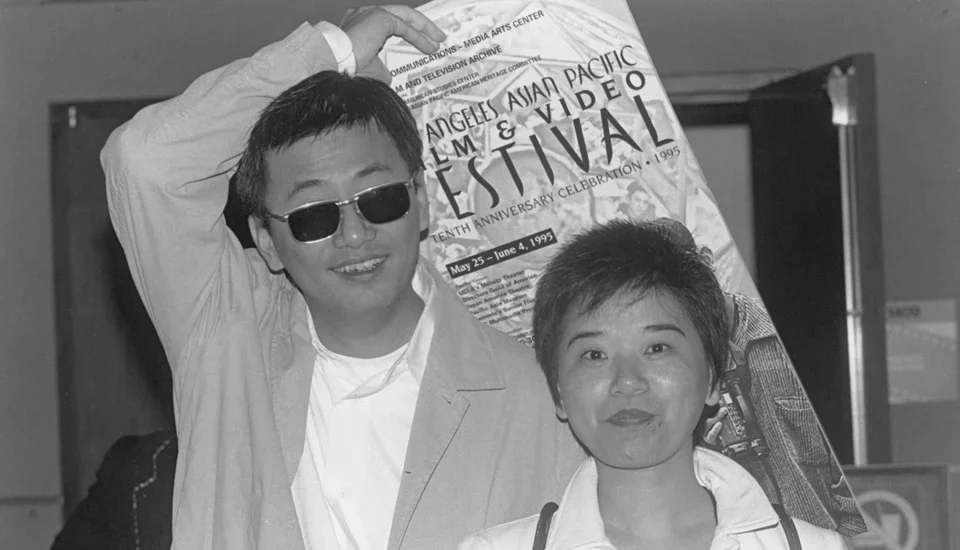
Visual Communications, the nation’s premier Asian Pacific American (APA) media arts center, established the Los Angeles Asian Pacific Film Festival (LAAPFF) in 1983 to promote APA cinema by showcasing the latest new works by established and emerging filmmakers and video artists and hosting filmmaker seminars, panel discussions and symposiums on topics relevant to Asian Pacific cinema.
The Festival has grown exponentially since, reflected not only by increases in both number of total works and artists, but also by substantial increases in attendance from a weekend-long series into a major annual showcase presenting the best of APA and Asian international media. From initially being housed in the then-Japan America Theatre, the Film Festival is now ensconced across Los Angeles and Southern California in various venues which include, the Aratani Theatre, Directors Guild of America, the Japanese American National Museum, CGV Cinemas, Japanese American Cultural & Community Center Regal L.A. LIVE, and more.
The Film Festival serves as a crucial launching ground for APA cinema through the premiere screenings of important new works as well as the development and nurturing of emerging talents via innovative programming initiatives including Digital Histories, the Armed With a Camera Fellowship, and C3: Conference for Creative Content. Past initiatives have included the VC Digital Academy, Project Catalyst, and the Visual Communications Film Development Fund. Award-winning artists presented in past Festivals have included:
• Alice Wu (SAVING FACE)
• Amyn Kaderali (CALL CENTER; KISSING COUSINS)
• Aneesh Chaganty (SEARCHING)
• Ang Lee (A FINE LINE; PUSHING HANDS)
• Anurag Mehta (AMERICAN CHAI)
• Arvin Chen (AU REVOIR TAIPEI)
• Bing Liu (MINDING THE GAP)
• Caylee So & Visal Sok (IN THE LIFE OF MUSIC)
• Charlie Nguyen (THE REBEL)
• Chris Chan Lee (YELLOW)
• Christine Choy (WHO KILLED VINCENT CHIN?)
• Curtis Choy (THE FALL OF THE I-HOTEL)
• Daniel Hsia (SHANGHAI CALLING)
• Daniel Park (KTOWN COWBOYS)
• Diane Paragas (YELLOW ROSE)
• Doan Hoang (OH, SAIGON)
• Eric Koyanagi (HUNDRED PERCENT)
• Erika Surat Andersen (TURBANS)
• Evan Jackson Leong (LINSANITY)
• Eyad Zahra (THE TAQWACORES)
• Gene Cajayon (THE DEBUT)
• Gene Rhee (THE QUEST FOR LENGTH)
• Georgia Lee (RED DOORS)
• Grace Lee (AMERICAN ZOMBIE; AMERICAN REVOLUTIONARY)
• Gregg Araki (THE LONG WEEKEND (’O DESPAIR))
• Greg Pak (ROBOT STORIES)
• Ham Tran (JOURNEY FROM THE FALL)
• Jennifer Phang (ADVANTAGEOUS)
• Jessica Yu (SOUR DEATH BALLS; THE LIVING MUSEUM; PING PONG PLAYA)
• Justin Chon (GOOK; MS. PURPLE)
• Justin Lin (BETTER LUCK TOMORROW; FINISHING THE GAME)
• Keiko Ibi (THE PERSONALS)
• Kip Fulbeck (BANANA SPLIT)
• Lena Khan (THE TIGER HUNTER)
• Lulu Wang (THE FAREWELL)
• Michael Kang (THE MOTEL; KNOTS)
• Mina Shum (DOUBLE HAPPINESS; LONG LIFE, HAPPINESS, AND PROSPERITY)
• Musa Syeed (VALLEY OF SAINTS)
• Nanfu Wang (HOOLIGAN SPARROW)
• Patricio Ginelsa (LUMPIA)
• Philip Kan Gotanda (LIFE TASTES GOOD)
• PJ Raval (CALL HER GANDA)
• Renee Tajima-Peña (WHO KILLED VINCENT CHIN?)
• Richard Wong (COLMA: THE MUSICAL)
• Rico Martinez (DESPERATE)
• Sarab Neelam (OCEAN OF PEARLS)
• Tanuj Chopra (PUNCHING AT THE SUN; CHEE AND T)
• Timothy Linh Bui (GREEN DRAGON)
• Trinh T. Minh-ha (SURNAME VIET, GIVEN NAME NAM)
• Tze Chun (CHILDREN OF INVENTION)
• Tran Trang (ALETHEIA)
• Wayne Wang (CHAN IS MISSING)
• Yu Gu (A WOMAN'S WORK: THE NFL’S CHEERLEADER PROBLEM)
and many others. The Festival has also brought the works of such renowned Asian international filmmakers to the attention of Southland moviegoing audiences:
• Amir Muhammad (THE LAST COMMUNIST)
• Anocha Suwichakornpong (BY THE TIME IT GETS DARK)
• Ann Hui (SONG OF THE EXILE; SUMMER SNOW)
• “Beat” Takeshi (SONATINE; ZATOICHI)
• Bora Kim (HOUSE OF HUMMINGBIRD)
• Buddhadeb Dasgupta (THE WRESTLERS)
• Chen Kaige (LIFE ON A STRING; TEMPTRESS MOON; TOGETHER)
• Dang Nhat Minh (THE RETURN; NOSTALGIA FOR COUNTRYLAND)
• Danny and Oxide Pang (THE EYE)
• Davy Chou (GOLDEN SHUMBERS; DIAMOND ISLAND)
• Hao Wu (PEOPLE’S REPUBLIC OF DESIRE)
• Hur Jin-ho (HAPPINESS)
• Im Kwon-taek (SOPYONGE)
• Jiu-Liang Wang (PLASTIC CHINA)
• John Woo (BULLET IN THE HEAD; ONCE A THIEF)
• Josh Kim (HOW TO WIN AT CHECKERS...)
• Julia Kwan (EVE & THE FIRE HORSE)
• Kore-eda Hirokazu (AFTER LIFE)
• Lee Myung-se (NOWHERE TO HIDE)
• Lino Brocka (BAYAN KO)
• Lixin Fan (LAST TRAIN HOME)
• Mabel Cheung (THE SOONG SISTERS)
• Mani Rathnam (BOMBAY)
• Marie Jamora (WHAT ISN'T THERE)
• Miike Takashi (THE BIRD PEOPLE IN CHINA; GOZU)
• Mike DeLeon (3RD WORLD HERO)
• Nia diNata (ARISAN!; CHANTS OF LOTUS)
• Nonzee Nimibutr (NANG NAK)
• Park Kwang-su (BLACK REPUBLIC; TO THE STARRY ISLAND)
• Pen-ek Ratanaruang (LAST LIFE IN THE UNIVERSE; INVISIBLE WAVES)
• Ramona Diaz (MOTHERLAND)
• Royston Tan (15)
• Shinobu Yaguchi (MY SECRET CACHE; WATERBOYS)
• Stanley Kwan (ROUGE; RED ROSE, WHITE ROSE)
• Steve Chen (DREAM LAND)
• Taika Waititi (TAMA TÜ; EAGLE VS. SHARK; BOY)
• Takita Yojiro (DEPARTURES)
• Teddy Chen (BODYGUARDS AND ASSASSINS)
• Tony Ayres (THE HOME SONG STORIES)
• Tran Anh Hung (CYCLO)
• Vea Mafile'o & Jeremiah Tauamiti (FOR MY FATHER'S KINGDOM)
• Waad al-Kateab & Edward Watts (FOR SAMA)
• Wong Kar-wai (CHUNGKING EXPRESS)
• Yung Chang (UP THE YANGTZE)
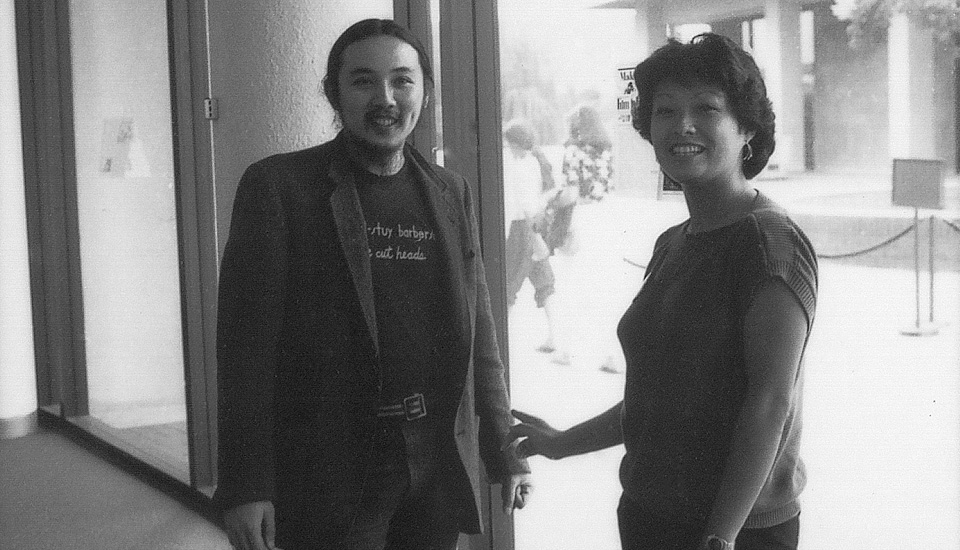
The inaugural edition of the Asian American International Film Festival, composed primarily of twenty films from the traveling edition of the Asian American International Film Festival organized and curated by Asian CineVision of New York City, premieres over an October weekend at the brand-new Japan America Theatre in Los Angeles Little Tokyo. Stephen Ning, the esteemed director of FRECKLED RICE, hitchhiked his way cross-country from his home in New York City to L.A. and showed up, unannounced, to his screening. Robert Nakamura’s FOOL’S DANCE was one of the highlights of the weekend, while a Korean feature, Im Kwon-taek’s MANDALA, also commanded considerable attention. The Festival signals Visual Communications’ interest in expanding the range of experiences emanating from its adopted home in Little Tokyo. More importantly, Visual Communications’ stewardship of the Festival announced that it was taking charge of how our communities’ visions and voices would be seen and heard.
Photo: Visual Communications Staff Producer Amy E. Kato greets Director Stephen Ning (FRECKLED RICE) at the newly-opened Japan America Theatre.
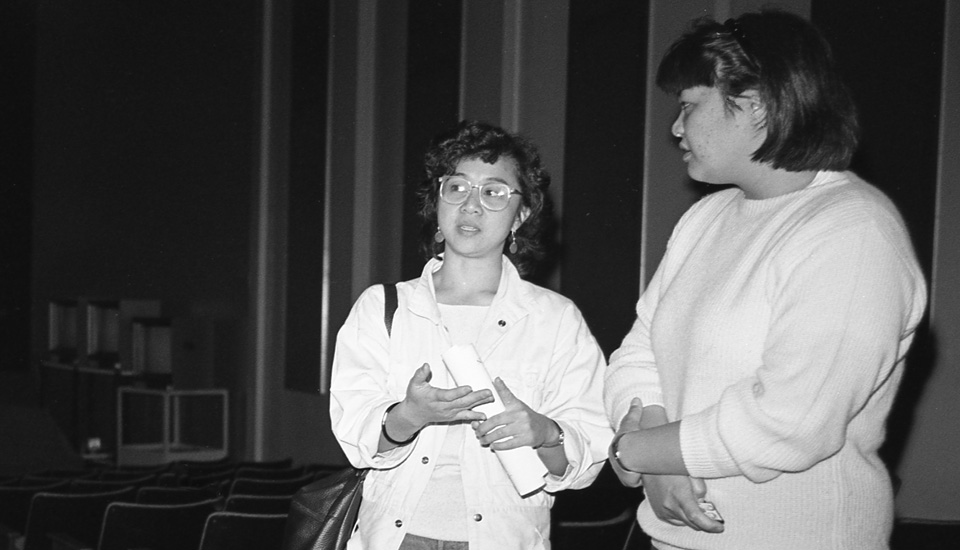
Visual Communications’ Executive Director, Linda Mabalot is introduced to Geoffrey Gilmore, the head of programming at the UCLA Film & Television Archive; the two agree that VC and the Archive should collaborate to present the Festival, an arrangement that would continue through the conclusion of the 1996 Festival. The very first co-directors of that festival, Estela Figueroa of VC and Claire Aguilar of UCLA, preside over another packaged traveling program from ACV. The Festival, spread over two weekends in October, included a retrospective showing of films on the occasion of Visual Communications’ 15th anniversary, and showcased a selection of short works highlighted by Ken Mochizuki, Dean Hayasaka, and Bill Blauvelt’s BEACON HILL BOYS.
Photo: Exhibitions Director Estela Figueroa (left) and UCLA Film & Television Archives Programmer Claire Aguilar.
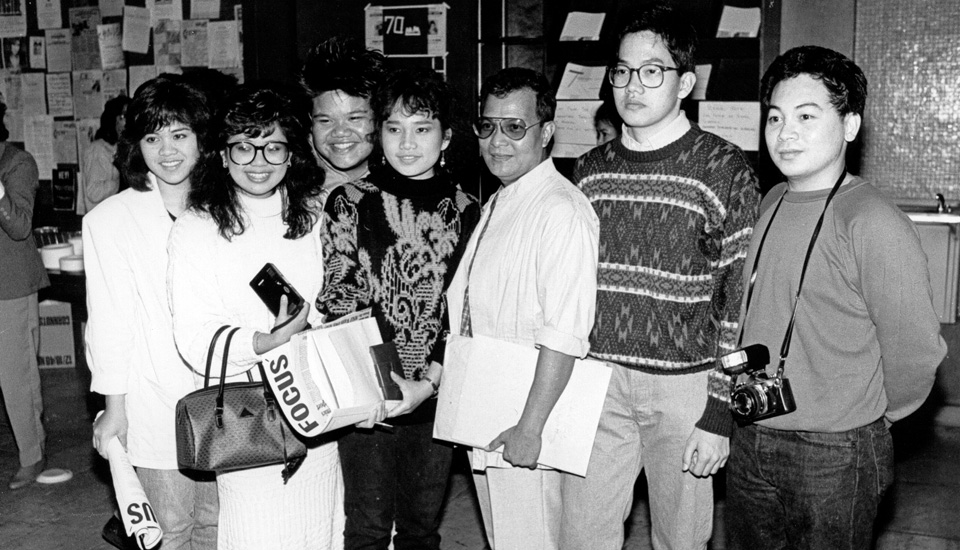
The Los Angeles Asian Pacific American International Film Festival (a name that is poked at in the pages of a local newsweekly as “the film festival with the world’s longest name ever”) is moved to springtime to take advantage of activities celebrating Asian Pacific American Heritage Month. In an effort to take advantage of the burgeoning curatorial talent the Festival was developing within its ranks, programming of the Festival occurs by way of a selection committee. Estela Figueroa would leave VC in 1986. Her replacement, Jeff Chop, and UCLA film school student James Aceron, team up with Claire Aguilar to organize that year’s Festival. Legendary Filipino director Lino Brocka came to town to introduce his now-legendary BAYAN KO, and in the midst of a full house, got called on the carpet by some Pinay feminista for the unflattering archetypes of women on full display in his film. The Festival also presented an actors’ panel featuring Rodney Kageyama and Kim Miyori among others; and an animators’ panel featuring Fu Ding Cheng, Mar Elepaño, and the irrepressible Arne Wong.
Photo: Legendary Filipino director Lino Brocka (third from right) is greeted by members of UCLA Samahang Pilipino at the screening of BAYAN KO.
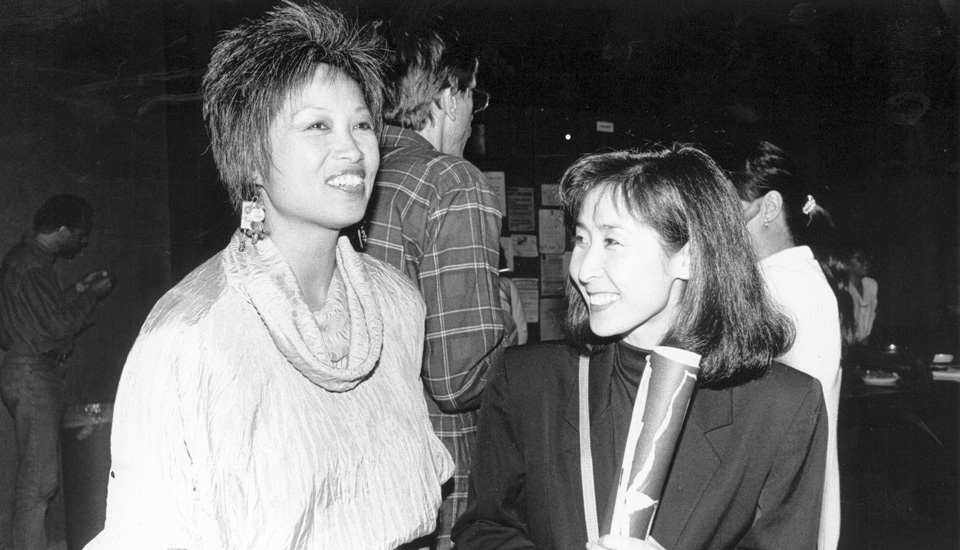
Abraham Ferrer is recruited to replace Jeff Chop as co-director of the Film Festival along with Claire Aguilar. ACV Executive Director Peter Chow came to town to screen his debut feature, PICKLES MAKE ME CRY. Curtis Choy’s THE FALL OF THE I-HOTEL is screened, and USC Animation Dept. Lab Supervisors Mar Elepaño and Everett Lewis team up to host the first edition of “Pioneering Visions,” a spotlight of new films locally produced by emerging Asian Pacific Americans that would grow into a perennial Festival highlight.
Photo: West coast meets east coast as directors Felicia Lowe (CARVED IN SILENCE) and Shirley Choi (NOTHING BUT TROUBLE) meet up at Opening Night.
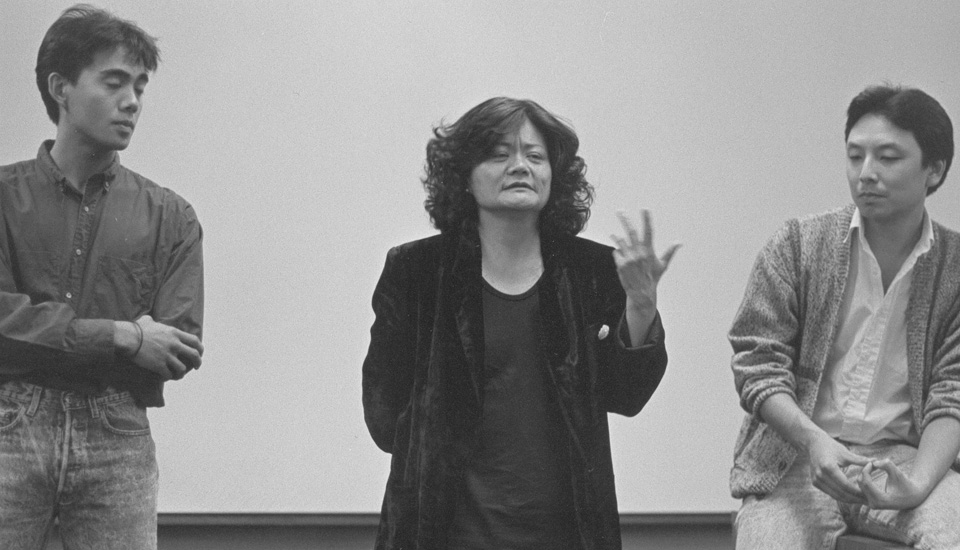
The Festival picks up its first long-term corporate sponsor in the California Lottery, a partnership that would last through 1996. The Festival was a blast. A new crop of high-profile short filmmakers headed by Kyung-ja Lee (HALMANI), Hei-sook Park (MIJA), Dan Tirtawinata (MAIL ORDER), Lise Yasui and Anne Tegnell (FAMILY GATHERING) present their works at the Festival. Among the new feature-length works showcased at that year’s Festival are Gregg Araki’s THE LONG WEEKEND (’O DESPAIR) and Bay Area-based filmmaker Trinh T. Minh-ha’s SURNAME VIET, GIVEN NAME NAM, with in-person appearances by both directors.
Photo: In a special lo-fi Super 8mm showcase, directors Dan Gambito (MARIA AVENUE) and Soji Kashiwagi (HONORABLE MENTION) listen in as Diana Yamashiro (TEACH THEM WELL) talks about her film.
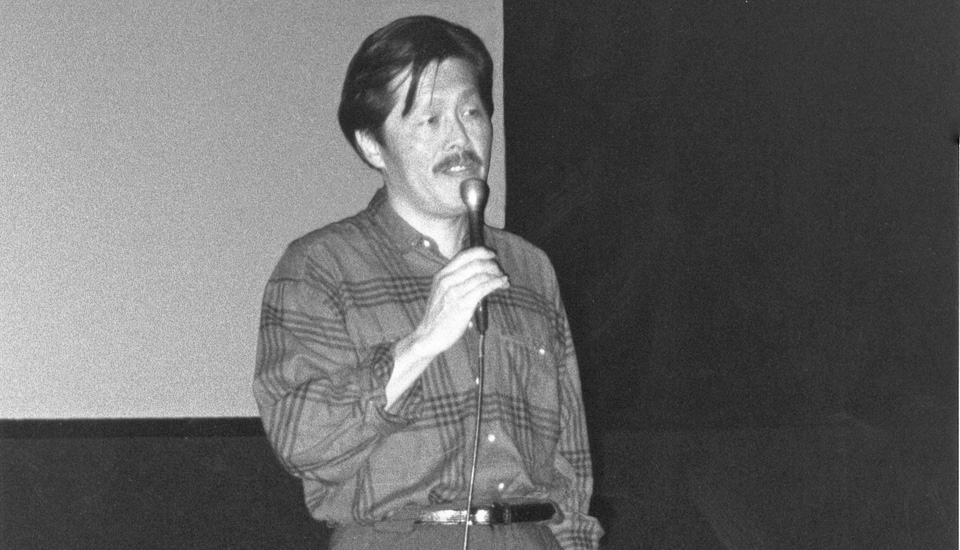
The Festival goes international with the Opening Night feature, Peter Wang’s FIRST DATE; and Kim U-son’s closer, YUN’S TOWN. In between, the Festival presents a program of experimental shorts from the MOWELFUND Film Institute, a Twentieth Anniversary program of shorts by Asian American film students from the UCLA Film School’s seminal Ethnocommunications Program, and host the Los Angeles Premiere screening of Shirley Sun’s IRON AND SILK, affording Festival audiences the first appearance of actress Vivian Wu. David Rathod’s loopy Desi comedy WEST IS WEST screens, as well as a North Korean take on THE TALE OF CHUN-HYANG.
Photo: Taiwanese director Peter Wang opens the 1990 Film Festival with the Los Angeles premiere screening of FIRST DATE.
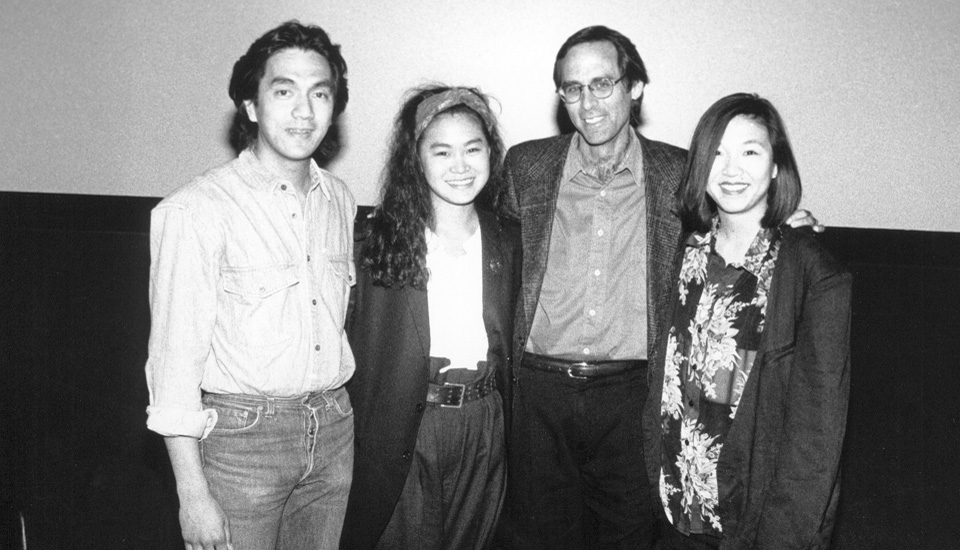
The Festival programs Wong Kar-wai’s hallucinogenic DAYS OF BEING WILD as the Festival’s Opening Night attraction, only to have the film pulled eight weeks beforehand by the producers for “additional editing.” Ominously, this would not be the last time such a switch would happen at the Festival. A distinctly Chinese flavor informs the Festival’s Opening and Closing events: THE BALLAD OF YELLOW RIVER by Teng Wenji and SONG OF THE EXILE by Ann Hui bookend the proceedings. Vanguard video artists Bruce and Norman Yonemoto premiere A HISTORY OF CLOUDS, and a special program of videoworks by Asian Pacific American women is showcased. Meanwhile, four feature-length filmmakers — Roddy Bogawa, Wood Lam, Rico Martinez, and Jon Moritsugu — converge on the Festival. A sign of things to come, perhaps?
Photo: Graduate Animation Supervisor and veteran film animator Mar Elepaño (far left) greets Festival artists Alena Tam (JUNIOR), Charles Davis (CAMBODIAN DOUGHNUT DREAMS), and Shane Liem (CRUELTY OF YOUTH).
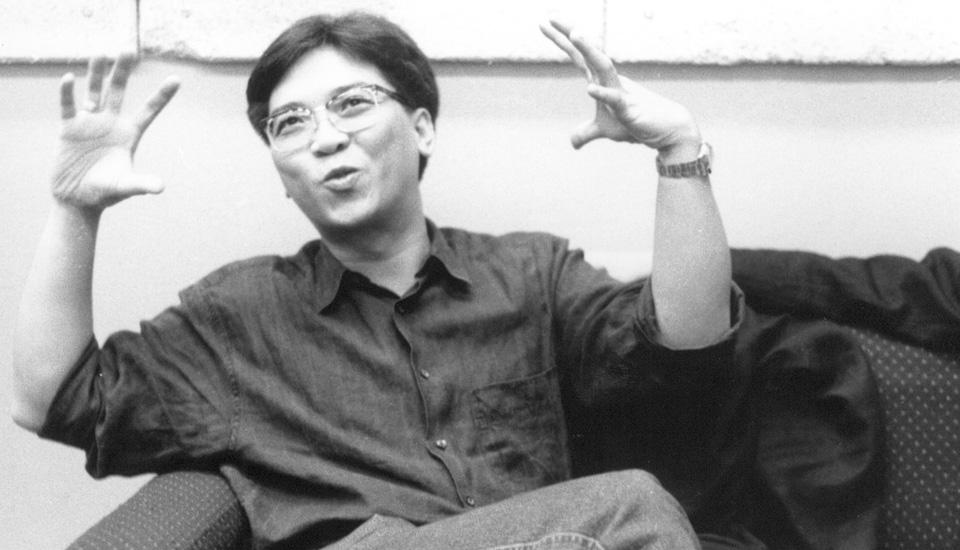
Claire Aguilar leaves the UCLA Film & Television Archive; MFA film student Cheng-Sim Lim is hired to take her place and to ramp up the Festival’s growing profile of Asian international cinema. The Los Angeles Asian Pacific Film & Video Festival (reflecting both its growing international aims as well as its recognition of the video medium) expands to an additional venue (the Laemmle Grande 4-Plex), and stages its activities in the aftermath of the Los Angeles Rebellion. Over six hundred people defy National Guard tanks and a city full of ill will to attend the Opening Night screening of Steven Okazaki’s TROUBLED PARADISE; and a Spotlight mini-series of works by Hong Kong director Stanley Kwan concludes with the sold-out Closing night screening of his film-within-a-film, RUAN LING YU. Fifty-nine films and videos are programmed, including a then-record twenty-two feature-length narrative and documentary films and videos.
Photo: Hong Kong director Stanley Kwan, the subject of a Festival Spotlight, is interviewed prior to the Closing Night Premiere screening of his RUAN LING YU, aka THE ACTRESS.
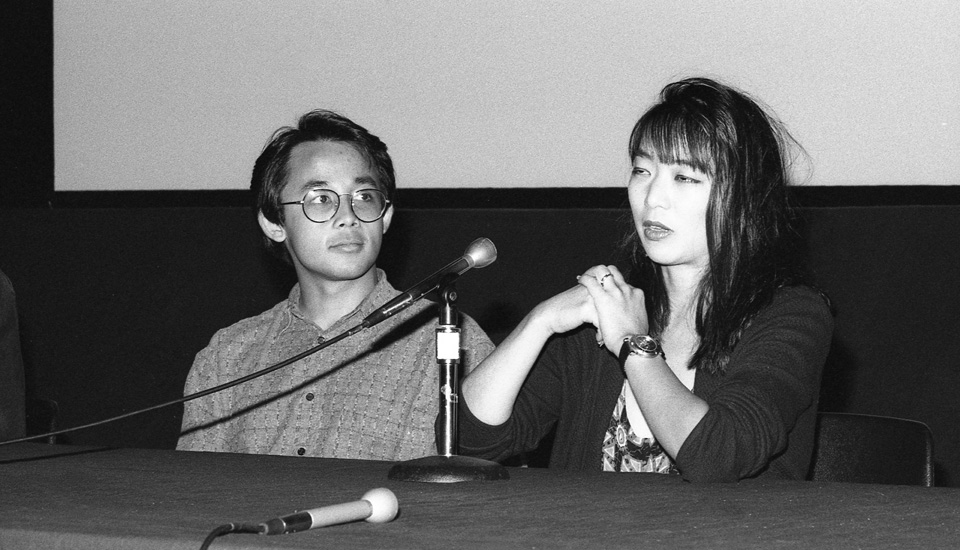
John Woo comes to the Festival to present a director’s cut version of his BULLET IN THE HEAD, as well as his ONCE A THIEF. Naturally, both screenings sell out. A tribute to Sessue Hayakawa and a national spotlight on Taiwan is included, affording Festival audiences its first look at the work of up-and-coming director Tsai Ming-liang (REBELS OF THE NEON GOD). Tiana Thi Thanh Nga’s FROM HOLLYWOOD TO HANOI opens the Festival; and CalArts grad Ming Ma organizes the Festival’s first-ever curated program, “Gender and Its Multiples.” Rico Martinez, back to introduce his latest feature, GLAMAZON, disses the upholstery in Melnitz Theatre during a screenwriters’ seminar, while VCers screen, among other selections, the short film DEBUT, by LMU grad student Gene Cajayon.
During the Festival’s “Pioneering Visions” showcase, future feature-length directors Gene Cajayon (DEBUT) and Jessica Yu (SOUR DEATH BALLS) talk about the making of their respective films.
Photo: During the Festival’s “Pioneering Visions” showcase, future feature-length directors Gene Cajayon (DEBUT) and Jessica Yu (SOUR DEATH BALLS) talk about the making of their respective films.
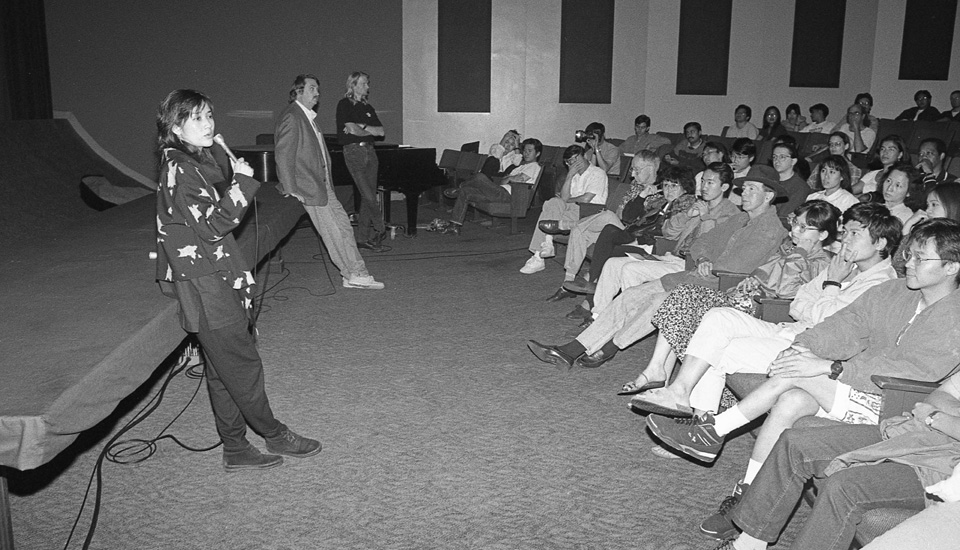
The year of Korean Cinema: Park Kwang-su (TO THE STARRY ISLAND) leads a quartet of new feature-length works into the Festival; while a couple of new samples of the new-look Chinese cinema are on display: Zhang Yuan’s BEIJING BASTARDS and Wang Xiaoshuai’s THE DAYS. The Festival opens with a screening of FLOWER DRUM SONG that includes a reunion of many of the members of the play’s many traveling castmembers and a touching tribute to featured player Guy Lee. A series of Ozu features are shown, as well as a mini-retrospective of works by Fluxus filmmaker Yoko Ono. One-hundred nineteen works are shown over the eleven-day Festival.
Photo: Acclaimed Hong Kong director Clara Law (left, with mic) presides over a sold-out Closing Night screening of her latest feature TEMPTATION OF A MONK.
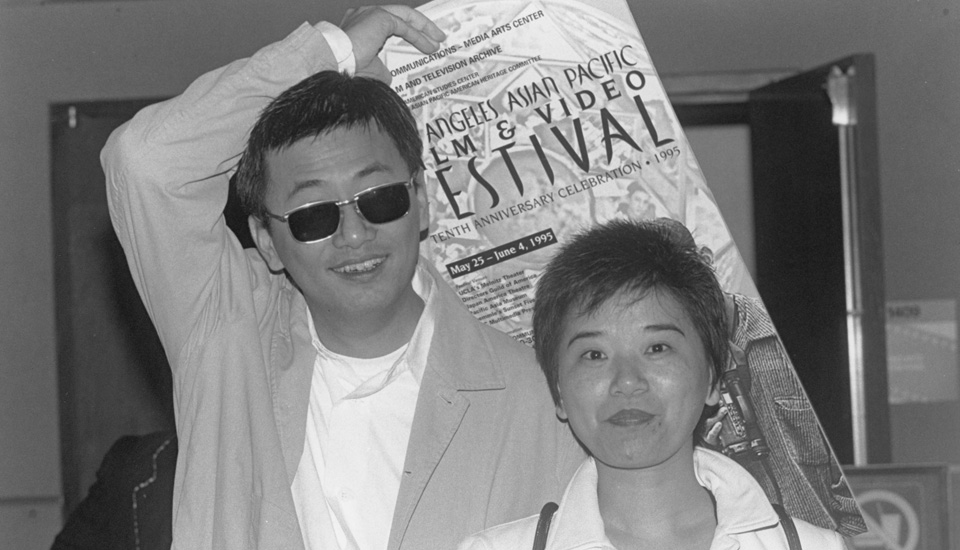
The Festival opens with Spencer Nakasako and Sokly Ny’s groundbreaking AKA DON BONUS. Red-hot director Wong Kar-wai holds up an overflow screening of his CHUNGKING EXPRESS (as well as celebrity presenter Quentin Tarantino) for close to 45 minutes while he and his entourage arrive from the hotel. Tsai Ming-liang presents his latest, VIVE L’AMOUR; while the Closing Night film, Stanley Kwan’s RED ROSE, WHITE ROSE, arrives from France with only 90 minutes to spare before showtime. Directors Mina Shum and Emily Liu arrive at the Festival with new feature-length works DOUBLE HAPPINESS and KANGAROO MAN, respectively. That year, the Festival presents programs for the first time at the Directors Guild of America, the beginning of a new alliance that would continue to this day; and confers its first-ever filmmaker awards to Laurie Wen (THE TRAINED CHINESE TONGUE) and Lawrence “Kip” Fulbeck (ASIAN STUDS NIGHTMARE).
Photo: Red-hot Hong Kong director Wong Kar-wai (left, with Film Festival poster) is the talk of the town as he supports the Los Angeles Premiere screening of his highly influential CHUNG KING EXPRESS.
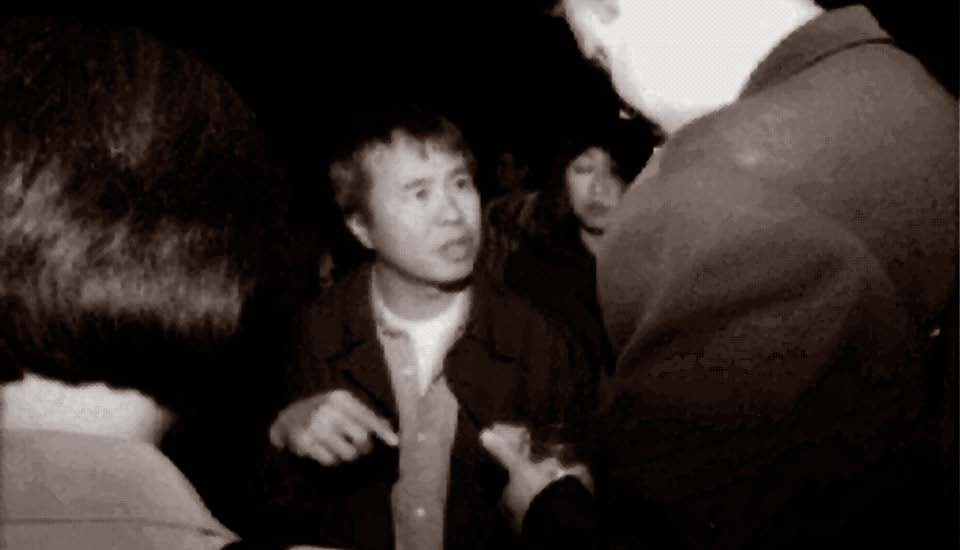
The Festival presents programs at the Los Angeles County Museum of Art. Highlights included the spectacle of watching filmmaker Cliff Son, on assignment for Giant Robot Magazine, get thrown off the Museum grounds for conducting off-color interviews with festival guests on Opening Night. A selection of Chinese music videos curated by Roger Garcia is included in the program. Hou Hsiao-Hsien’s GOOD MEN, GOOD WOMEN opens the Festival, while Tran Anh Hung’s CYCLO closes it. A selection of new works from Vietnam, in-person appearances by directors Edward Yang, Trinh T. Minh-ha, and Dang Nhat Minh, and a screening of Ishii Takashi’s gangster thriller GONIN are just some of the highlights. At the conclusion of that year’s edition, VC and the Archive dissolve its collaborative relationship, leaving Visual Communications to continue as sole organizer and presenter.
Photo: Famed Taiwanese director Hou Hsiao-hsien (center) is mobbed by well-wishers following the screening of his GOOD MEN, GOOD WOMEN.
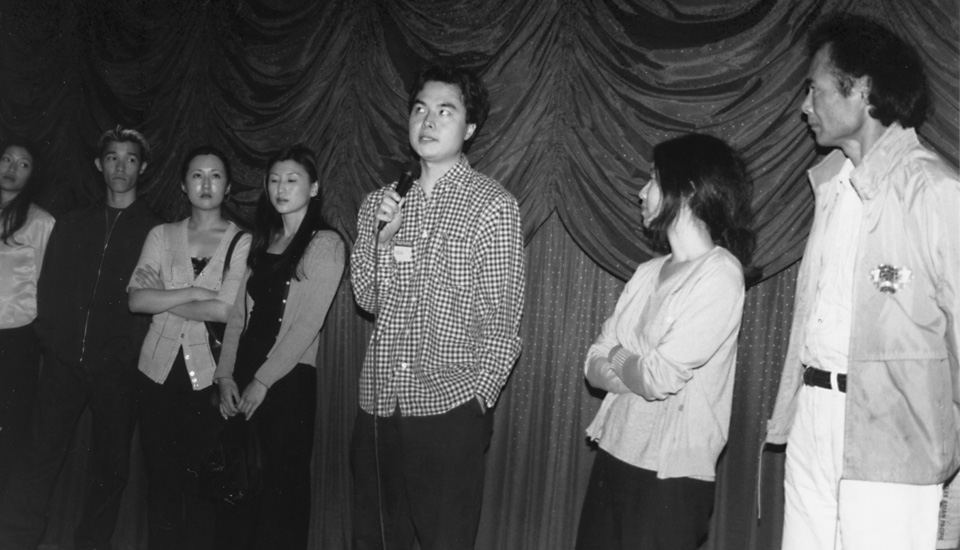
The Los Angeles Asian Pacific Film & Video Festival presents a reduced program slate consisting of a relatively paltry fifty five productions crammed into two rooms at the Laemmle Music Hall Theatre in Beverly Hills. All challenges aside, the Festival benefited that year from the presentation of three new and daring feature films that, when joined with Renee Tajima-Peña’s Opening Night feature, MY AMERICA…OR HONK IF YOU LOVE BUDDHA, announced new and challenging directions for Asian American cinema, and for the Festival in particular. The standing-room crowds that support Chris Chan Lee’s YELLOW, Eric Nakamura and Michael Idemoto’s SUNSETS, and Rea Tajiri’s STRAWBERRY FIELDS are augmented by the creation of the weekend-long Asian American Independent Feature Workshop, organized by Quentin Lee and Anita Chang. Chen Kaige’s TEMPTRESS MOON closes the Festival, which begins its exploration of new voices from Southeast Asian countries. The 1997 Film Festival also sees the beginnings of both a Festival volunteer organizing team and honorary fundraising board.
Photo: As director Julie Cho and actor Arthur Nakane (DOG DAY VISIT) looks on, director Chris Chan Lee (center) talks about the making of his influential feature narrative YELLOW.
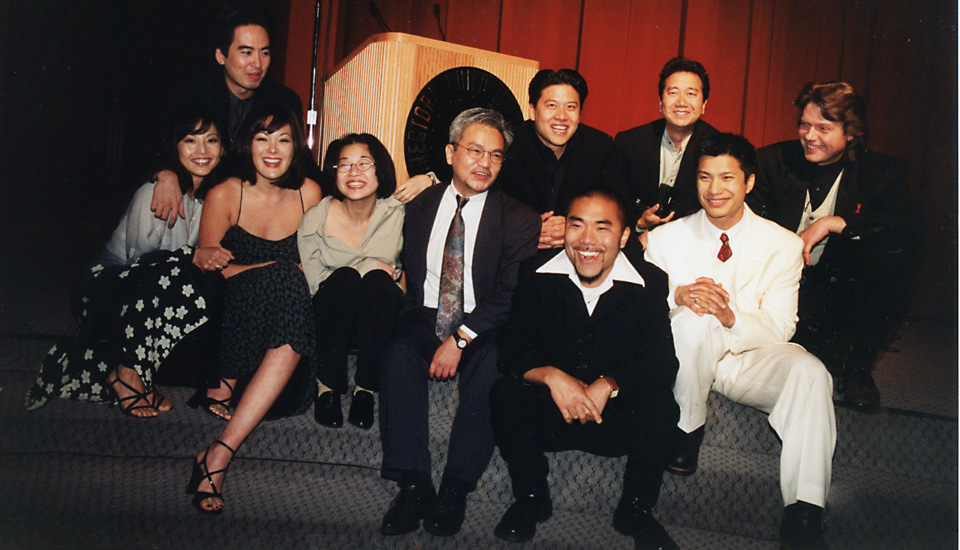
Some lady who was representin’ as the Crown Princess of Malaysia (or something like that) made a splashy entrance into the Festival’s Opening Night attraction, Eric Koyanagi’s HUNDRED PERCENT. The Asian American Independent Feature Workshop crowded into Visual Communications’ new space in Little Tokyo, while the Festival takes up formal residence at the Directors Guild of America and Japan America Theatre. Festival organizing team member David Magdael is appointed Festival Co-Director alongside Abraham Ferrer. Asian American feature works programmed that year included Tim Chey’s audience-polarizing FAKIN’ DA FUNK, Spencer Nakasako’s KELLY LOVES TONY, Francisco Aliwalas’ DISORIENTED, Camera Obscura’s VIRTUE, Ann Kaneko’s OVERSTAY, and Lana Lin’s ALMOST THE COCKTAIL HOUR. Justin Lin, Chris Chan Lee, Eric Nakamura and Michael Idemoto, and Rea Tajiri team up to produce a five-part omnibus feature, OBITS. And the Festival resurrects its filmmaker awards with presentation of the King Hu Award and New Directors/New Visions Award to Corey Ohama (DOUBLE SOLITAIRE) and Khmasea Hoa Bristol (RED PERIL).
Photo: Post-Opening Night, the cast and crew of HUNDRED PERCENT can finally exhale (from left): Tamlyn Tomita, Stan Egi, Lindsay Price, Keiko Agena, Producer Jusak Yang Bernhard, Garret Wang, Director Eric Koyanagi, Cinematographer Michael Goi, Dustin Nguyen, and Producer Paul Bens, Jr.
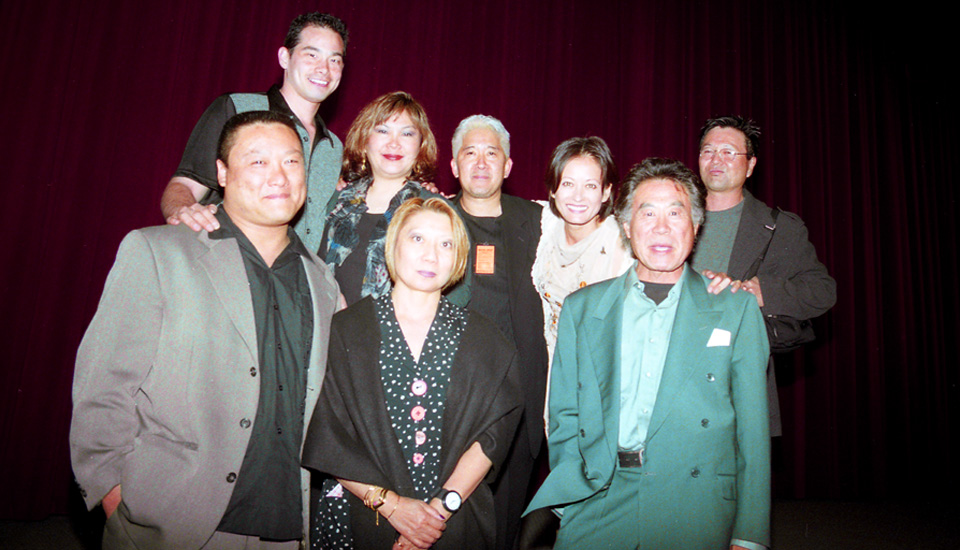
The Festival presents a special mini-series, “A Taste of Thai” in recognition of the exemplary works coming out of Thailand, but this Festival will be best remembered for the technical bugaboos that plagued the projection of numerous Festival programs. Organizers discover that the Japan America Theatre isn’t equipped to play back sound in Dolby (a problem that has since been fixed for subsequent screenings). Organizers also find out that in the DGA Video Room, Festival staff had to furnish its own tape operators. In more positive developments, Philip Kan Gotanda’s LIFE TASTES GOOD opens the Festival, and the Festival ramps up its involvement with local queer API organizations with the local premiere of Yonfan’s BISHONEN. Festival screening programs are held for the first time in the David Henry Hwang Theatre, located two flights up the stairs from Visual Communications. The King Hu Award is renamed the Golden Reel Award, and is presented to THE LAST SEVEN DAYS OF ANNIE ONG, which itself was not immune to a major technical glitch — told in diaristic fashion, the running time exceeded the length of the tape, running out midway through Day 7. Miike Takashi’s THE BIRD PEOPLE IN CHINA, co-starring Asian American acting pioneer Mako, closes the Film Festival.
Photo: Director Philip Kan Gotanda (center rear) with the crew from LIFE TASTES GOOD, the 1999 Film Festival’s Opening Nighter (from left): Kelvin Han Yee, Tim Lounibos, Producer Diane Takei, Editor Maysie Hoy, Director Philip Kan Gotanda, Julia Nickson, Sab Shimono, and Composer Dan Kuramoto.
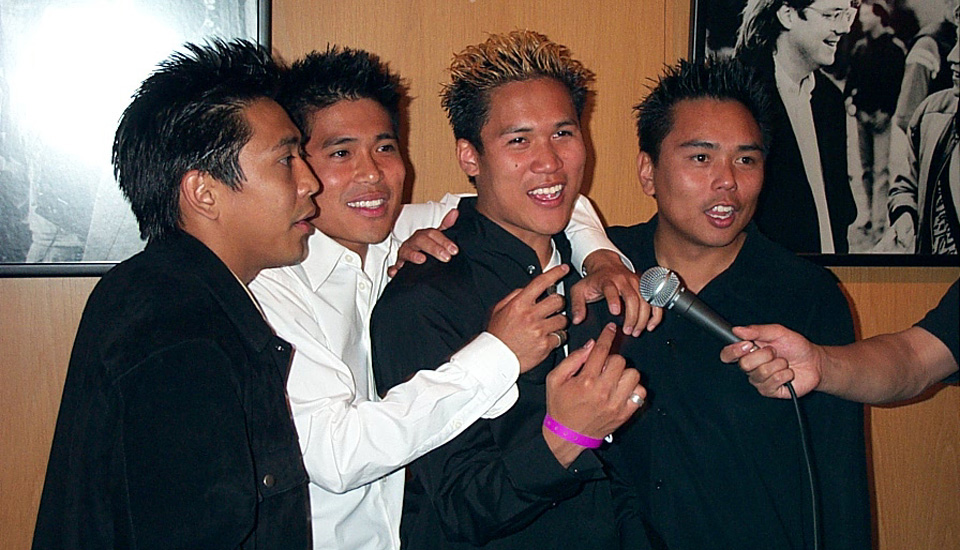
The organizing staff of the newly-renamed Visual Communications Los Angeles Asian Pacific Film & Video Festival (VC FILMFEST for short) endures a major trauma just days before Opening Night: the passing of popular VC boardmember Duane Ebata from throat cancer. Thank god, then, for Gene Cajayon’s THE DEBUT (an expanded and drastically re-envisioned version of his Festival 1993 short), which sold out the DGA for two World Premiere screenings. Erika Surat Anderson’s TURBANS may have taken home the Golden Reel Award that year — and deservedly so — but everyone was buzzing about another award nominee, Julie Gaw’s SHIT-THE MOVIE, a hit-and-run news documentary that had audiences reeling in the aisles. Deann Borshay Liem’s arresting FIRST PERSON PLURAL closed the Festival that year.
The Brothers Basco (from left: Dion, Darion, Dante, and Derek) are interviewed prior to the sold-out World Premiere screening of Gene Cajayon’s THE DEBUT.
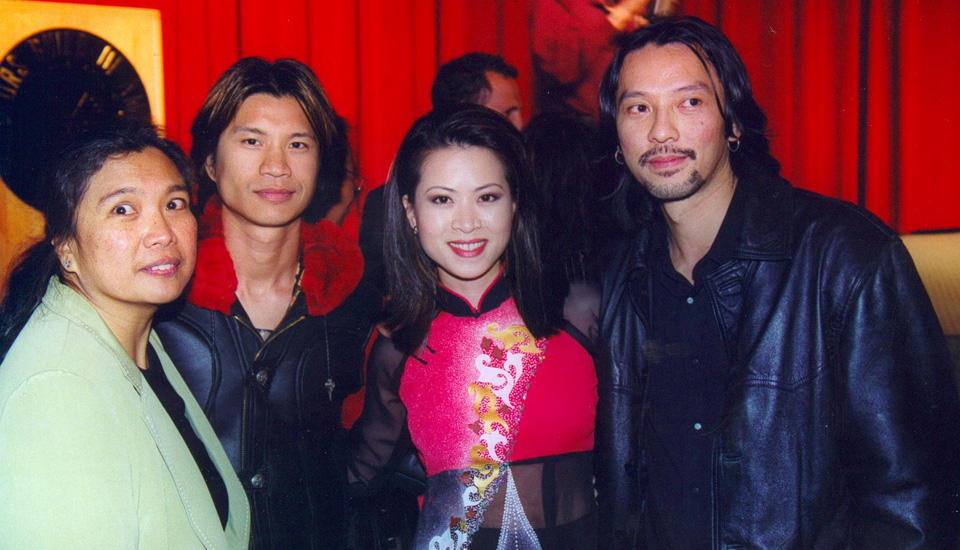
Timothy Linh Bui’s touching GREEN DRAGON bookends the Festival with a newly-restored 35mm print of John Korty’s FAREWELL TO MANZANAR. Rod Pulido’s THE FLIPSIDE draws nearly 1,400 people to its two screenings and is adjudged the Festival’s Most Popular Film. Puntip Limrungroj, of the Art Center College of Design’s cinema department, scores the Festival Golden Reel Award for BODY AND SOUL, while Sara Kealani Takahashi’s visually arresting CUT CUT RECUT is awarded the New Directors/New Visions Award. This year’s Film Festival marks a national mini-spotlight on Malaysia and, more significantly, the first Festival visit by Malaysian digital cinema proponent Amir Muhammad. The members of Orange County ska/punk band No Doubt arrive to support Anurag Mehta’s award-winning AMERICAN CHAI, while a capacity audience welcomes the screening of Thai director Yongyooth Thongkonthun’s sports comedy THE IRON LADIES.
Photo: Visual Communications’ Executive Director Linda Mabalot (far left) and director Timothy Linh Bui (GREEN DRAGON, far right) are joined after the sold-out Opening Night screening by co-emcees, actor Dustin Nguyen and newscaster Lena Nguyen.
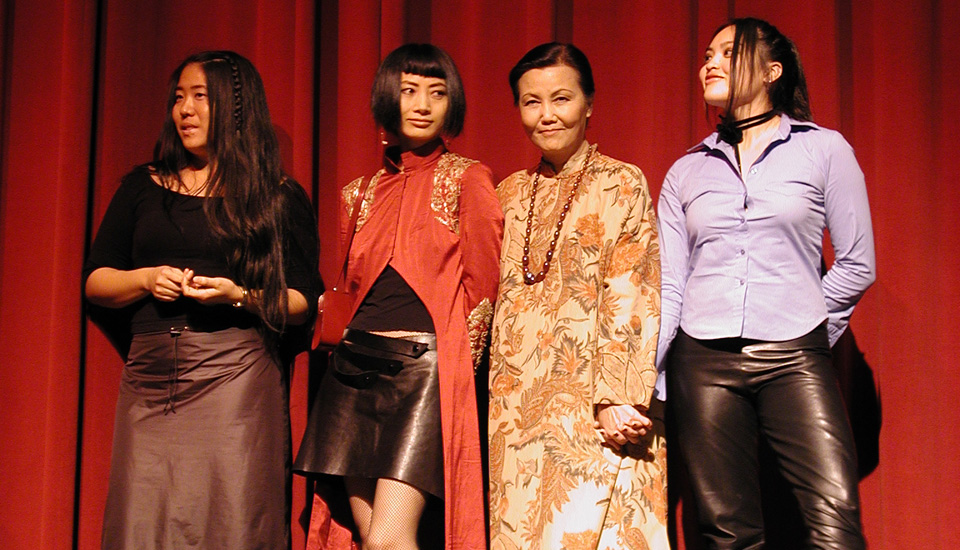
The year of Justin Lin’s BETTER LUCK TOMORROW also sees the unveiling of new works created through a new Visual Communications programming initiative — the Armed With a Camera Fellowship for Emerging Artists. Coupled with new works created through VC’s Digital Academy, we insure a space for in-house productions at the Festival. Two VC FILMFEST alums, Greg Pak and Bertha Bay-sa Pan, bring first features to the Festival — for Greg, a “road test” screening of his just-out-of-the-lab ROBOT STORIES; and for Bertha, the expanded version of FACE, which she showed at the Festival in 1998. A DGA-sponsored preview screening of former VC FILMFEST Spotlight Director John Woo’s WINDTALKERS commands a standing room audience; while Romeo Candido’s LOLO’S CHILD elicits heated post-screening discussion over its decidedly misogynistic imagery. Not to be outdone, an almost-nude pre-show performance preceding the screening of Shinobu Yaguchi’s WATERBOYS causes a sensation. Award-winning documentary filmmaker Freida Lee Mock is the subject of a Festival Spotlight, while Festival veteran Grace Lee scores the Golden Reel Award for BARRIER DEVICE.
Photo: Ladies rule: on the DGA mainstage, director Bertha Bay-sa Pan (far left) is supported by actors Bai Ling, Kieu Chinh, and Kristy Wu during the Festival Centerpiece screening of Pan’s FACE, an expansion of a short film she presented at the 1998 Film Festival.
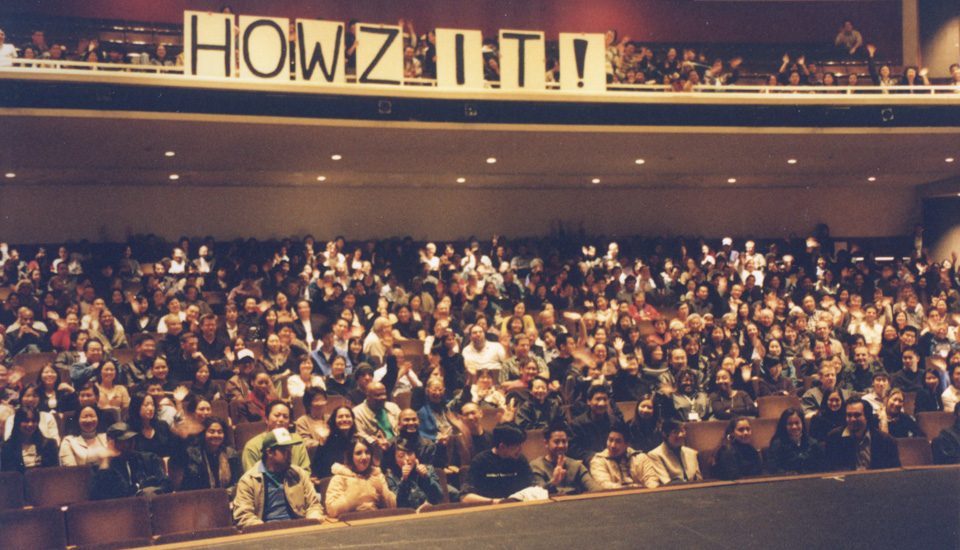
The twenty-nine feature films and videos unspooled during Festival Week 2003 was bookended by Opening Night selection LONG LIFE, HAPPINESS, AND PROSPERITY by Mina Shum and TOGETHER by Chen Kaige. Festival programs including the premiere of the Pang Brother’s THE EYE are presented at the newly-opened ArcLight Hollywood. We screen 148 films and videos, including a youth- media program curated by filmmaker Rima Anosa and a sold-out offering of Armed With a Camera productions. Ham Tran’s touching THE ANNIVERSARY wins both the Festival Golden Reel and New Directors/New Visions Award. However, the Festival organizing team stage Festival Week without longtime Visual Communications Executive Director Linda Mabalot, who is diagnosed with lung cancer and enters the hospital the weekend before Opening Night. Mabalot, who herself stepped in as E.D. following the unexpected passing of former Visual Communications helmer Steven Tatsukawa in 1984, would pass away one week after the conclusion of VC FILMFEST 2003 on May 19 — Malcolm X’s birthday.
Photo: On Festival Closing Night at the Aratani/Japan America Theatre, the capacity crowd sends much love to Visual Communications Executive Director Linda Mabalot, who was hospitalized shortly before the start of Festival Week 2003.
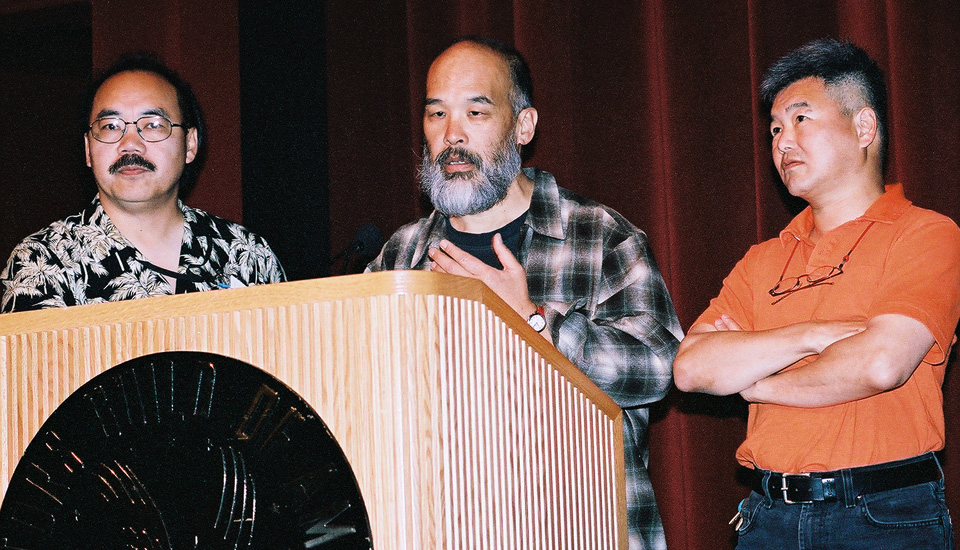
In spite of the decimation of the California Arts Council and fluxuating government dollars for arts programming, the Festival unspools 181 film and videoworks over eight days by makers of Asian descent from all over the world. The Film Festival, which presents programs at the ArcLight Hollywood in addition to the Directors Guild of America and Aratani/Japan America Theatre, is the first under the stewardship of newly-appointed Executive Director Leslie A. Ito. An Opening Night screening of Wayne Wang’s classic CHAN IS MISSING anchors a five-part tribute; while a three-part retrospective of Zatoichi films precedes the sold-out Closing Night premiere of “Beat” Takeshi’s ZATOICHI. It’s a “down” year for Asian Pacific American feature film output, so the resulting program line-up reflects a more pronounced international feel. Animator Sam Chen’s monochrome ETERNAL GAZE is handed the Festival Golden Reel Award, and Karen Lin’s PERFECTION wins the rechristened Linda Mabalot New Directors/New Visions Award.
Photo: As film editor and Visual Communications boardmember Walt Louie looks on, veteran cinematographer Michael Chin and sound recordist Curtis Choy reflect on the impact of working on Wayne Wang’s groundbreaking CHAN IS MISSING.
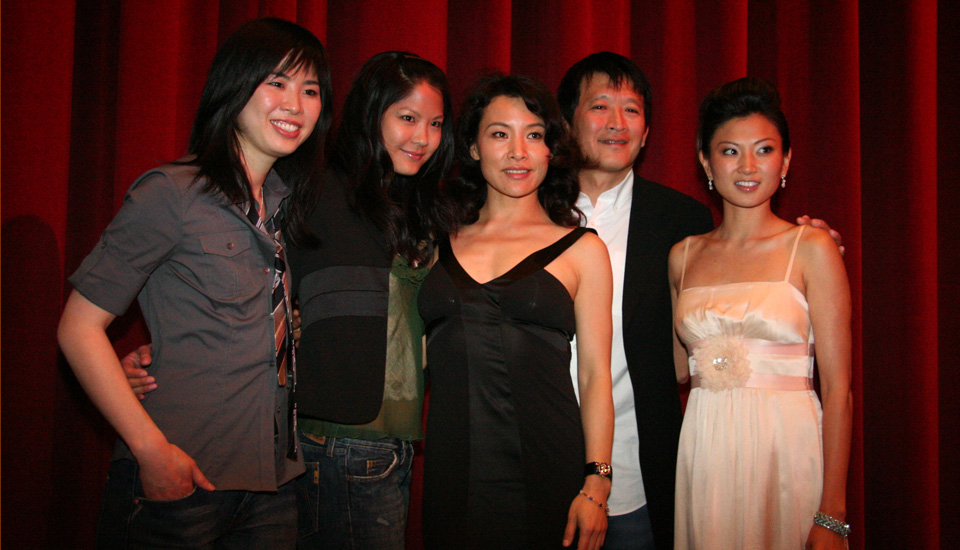
A pair of New Yorkers, Alice Wu and Georgia Lee, open and close the 21st edition of VC FILMFEST: The Los Angeles Asian Pacific Film Festival (organizers drop the word “video” from the name) with impressive first features, SAVING FACE and RED DOORS—the first time that API women open and close Festival Week. The Festival picks up a major sponsor in AZN Television, signaling a more pronounced measure of support for the Film Festival from the corporate community. Noted playwright and documentary subject Frank Chin behaves himself, but just barely, during the Q & A session for Curtis Choy’s WHAT’S WRONG WITH FRANK CHIN?, while the Festival’s inaugural midnight series at the Laemmle’s Sunset 5 Theatre scores a sellout with the Jet Li actioner UNLEASHED, and turns stomachs with the omnibus feature THREE: EXTREMES. The Armed With a Camera Fellowship premiere screening moves for the first time into the Aratani/Japan America Theatre, anchoring a Visual Communications “Premiere Night” that includes the World Premiere screening of the organization’s GRASSROOTS RISING by director Robert Winn. Helen H. Lee’s SOPHIE wins the Festival Golden Reel Award, while TAMA TÜ by Maori filmmaker Taika Waititi bags the Linda Mabalot New Directors/New Visions Award.
Photo: Director Alice Wu (far left) and Lynn Chen, Joan Chen, Producer Teddy Zee, and Michelle Krusiec celebrate the Opening Night screening of SAVING FACE at the Directors Guild of America.
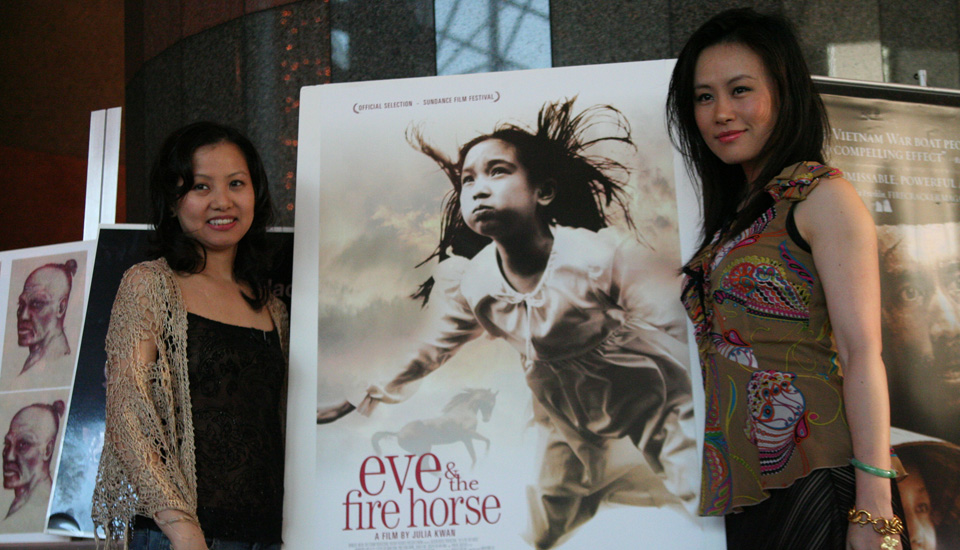
A trio of former Festival Golden Reel Award nominees — Ham Tran (JOURNEY FROM THE FALL), Julia Kwan (EVE & THE FIRE HORSE), and Tanuj Chopra (PUNCHING AT THE SUN) — anchor that year’s Film Festival, while Eric Byler’s AMERICANese, an adaptation of novelist Shawn Wong’s American Knees, draws an overflow Closing Night crowd to the Aratani/Japan America Theatre. Honda Motors signs on as the Film Festival’s first Presenting Sponsor, a partnership that continued through 2008. Programs are presented in the Laemmle’s Sunset 5 Theatre and the brand-new National Center for the Preservation of Democracy in Little Tokyo. For the first time, Grand Jury Awards are conferred in feature-length narrative and documentary categories, in part to recognize the dramatic upturn in quality feature-length filmmaking by Asian Americans. Michael Kang’s THE MOTEL walks off with the Grand Jury Award, but the “buzz” is reserved for Bay Area native Richard Wong’s COLMA: THE MUSICAL, a formalistically challenging coming-of-age drama disguised as a campy musical. Kris Chin and Ron Oda’s dark comedy ASIAN STORIES (BOOK 3) sells out DGA 1 — and walks off with the Festival Audience Award.
Photo: Director Julia Kwan (left) and actor Vivian Wu support the Festival Centerpiece presentation of EVE AND THE FIRE HORSE at the Directors Guild of America.
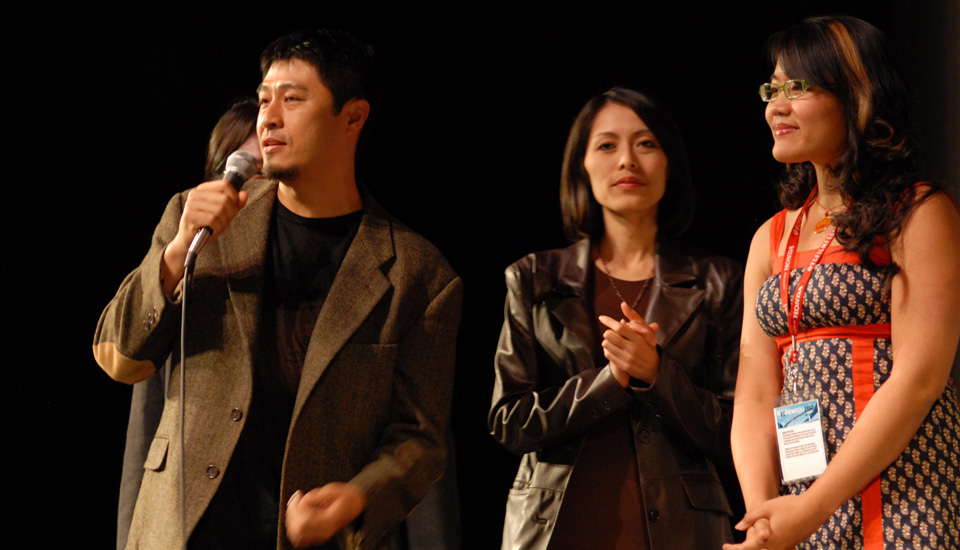
Justin Lin’s fifth feature-length narrative, FINISHING THE GAME, opens the 2007 Film Festival and reunites many of the cast and crew who worked together on the earlier BETTER LUCK TOMORROW. Action and genre films rule the program line-up, as Charlie Nguyen’s adrenaline-rush of a feature THE REBEL not only sells out its Closing Night engagement at the Aratani/Japan America Theatre, but also walks away with the Grand Jury Award. In keeping with the genre theme of that year’s Film Festival, newcomer Juwan Chung’s gangster epic BABY wins a Special Jury Award as well as a citation for Best Newcomer Performance by lead actor David Huynh. Festival veteran Ruby Yang’s Oscar-winning THE BLOOD OF YINGZHOU DISTRICT snares the Festival Golden Reel Award, while Tadashi Nakamura’s PILGRIMAGE wins the Linda Mabalot New Directors/New Visions Award.
Photo: Director Charlie Nguyen (left) Producer Tawny Nguyen and crew member Jenni Trang Le celebrate onstage at the Aratani/Japan America Theatre as THE REBEL is named the Grand Jury Award Winner for Best Narrative Feature.
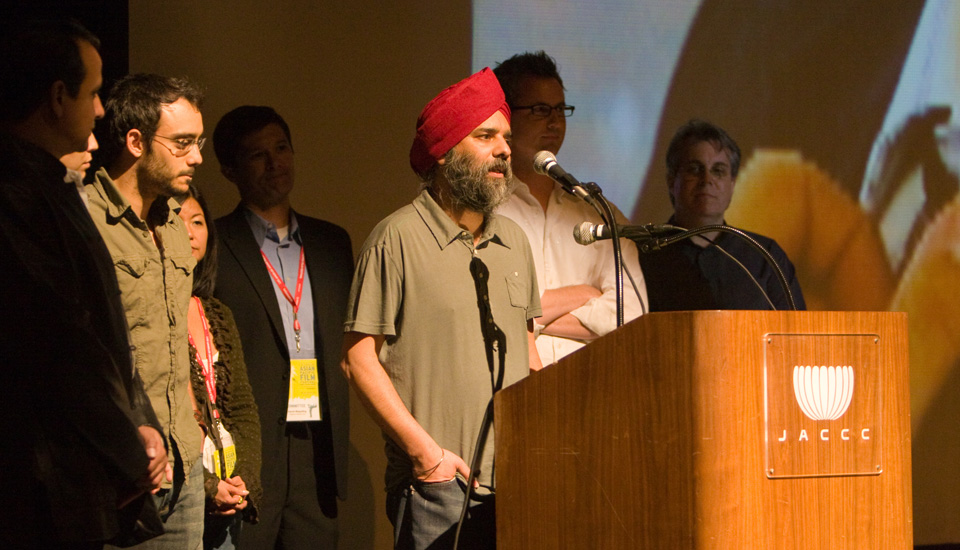
Beginning in 2008, the Film Festival goes by the moniker The Los Angeles Asian Pacific Film Festival. A program line-up boasting 169 film and video works is book ended by Jessica Yu’s first narrative feature PING PONG PLAYA, which opens the Festival at the DGA, complete with a regulation-size ping pong table in the DGA Atrium; and Tony Ayres’ THE HOME SONG STORIES, the third Closing Night offering in the Festival’s history to star the luminous Joan Chen. With seven feature-length films in the line-up, the Philippines was the Festival’s national spotlight; while a strong profile of works from Southeast Asia was anchored by the multi-award winning FLOWER IN THE POCKET from Malaysia, and two works from Indonesia including CHANTS OF LOTUS, by a quartet of directors headed by Festival veteran Nia diNata. Women also made their presence known, as Daisy Lin Shapiro (YOURS TRULY, MISS CHINATOWN) and Diana Lee Inosanto (THE SENSEI) brought huge crowds to the Film Festival. Festival screenings weren’t strictly confined to traditional settings: Film Festival veteran Ming-yuen S. Ma present the completed “Xin Lu” series as the centerpiece of a rolling bus tour of L.A., while John Torres’ YEARS WHEN I WAS A CHILD OUTSIDE is given a special multi-screen presentation. Leonard Lee and Marsha Newbery’s TAILOR MADE: CHINATOWN’S LAST TAILOR received the Festival Golden Reel Award, and Korean director Na Hong-jin received the Linda Mabalot New Directors/New Visions Award for his hypnotic SWEAT, a precursor of sorts to his feature-length breakout THE CHASER. Above all, Festival 2008 will go down as the year when Desi cinema ruled: Amyn Kaderali’s romantic comedy KISSING COUSINS packs the DGA; while Sarab Neelam’s timely OCEAN OF PEARLS walks off with both the Festival’s Grand Jury Award and Audience Award for Narrative Feature.
Photo: As his cast and jury members look on, director Sarab Neelam (center) accepts plaudits at the Aratani/Japan America Theatre as his OCEAN OF PEARLS is named the Grand Jury Award Winner for Best Narrative Feature, as well as Festival Audience Award Winner for Narrative Feature.
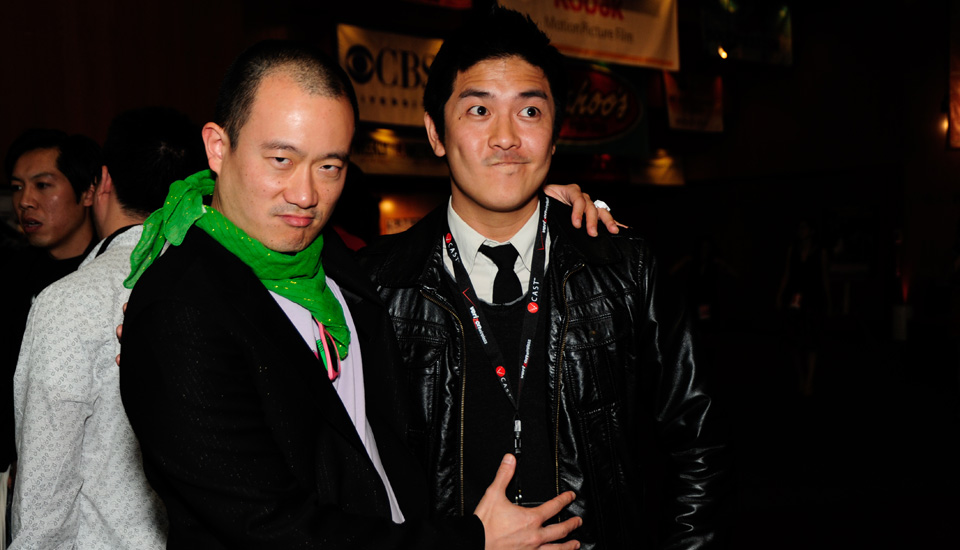
The Los Angeles Asian Pacific Film Festival team assembles a 25th anniversary program line-up boasting 181 films and videos from nearly 20 countries — tying the record for most individual works in the Film Festival, set in 2004. Among this crop of works is a national spotlight observing the resurgence of Japanese cinema, a continued spotlight on the emerging cinemas of Southeast Asia, a slate of new documentary and narrative features vying for the Film Festival’s Grand Jury Awards, a slate of exciting and provocative seminars and panels, and an anticipated guest list of over 100 filmmakers from Southern California and throughout the world. A few memorable films included: Yojiro Takita’s Oscar-winning DEPARTURES, which closed the Festival, Tze Chun’s Opening Nighter CHILDREN OF INVENTION, which took home the Grand Jury Prize for Outstanding Feature-Length Narrative, and So Yong Kim’s TREELESS MOUNTAIN, another Grand Jury winner. Audience awards recognized KARMA CALLING by Sarba Das as well as Christopher Wong’s insightful documentary WHATEVER IT TAKES. Gilead Sciences collaborates with the Festival as a new sponsor of the Grand Jury and Audience Awards, not only to support the films but also to raise awareness for hepatitis B in the Asian Pacific American community.
Photo: At the Festival’s Opening Night at the Directors Guild of America, spoken-word artist Beau Sia (left) knows how to put director Tze Chun (CHILDREN OF INVENTION) at ease before his screening.
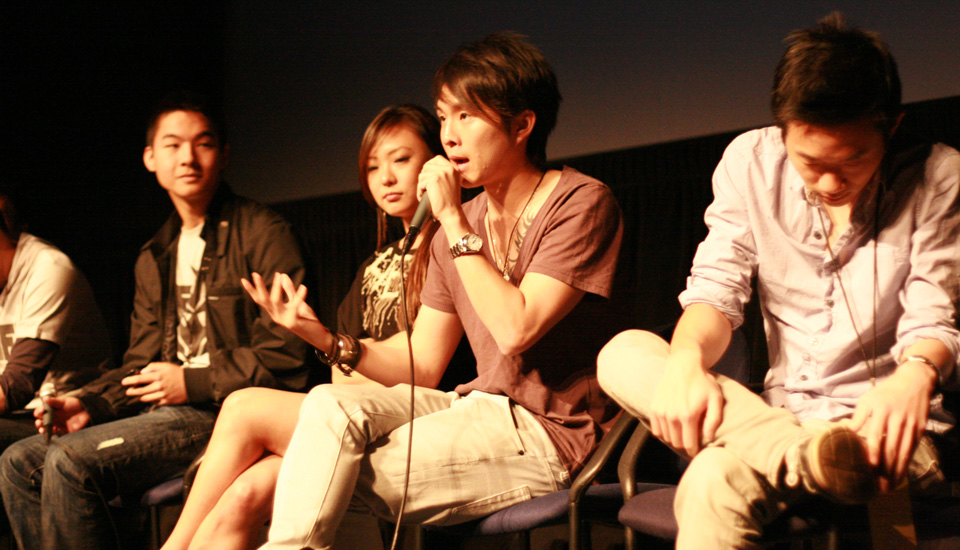
Two additional days are added to the Film Festival, expanding the event to ten days. The expansion allows audiences more opportunities to see many of the Festival’s award-winning films, highlighted by sold-out screenings of Arvin Chen’s opening feature AU REVOIR TAIPEI, Quentin Lee’s THE PEOPLE I’VE SLEPT WITH, and Eyad Zahra’s THE TAQWACORES. Various highlights mark this year’s Festival, such as the return of VC Digital Posse, the introduction of a Short Screenplay Competition, and a celebration of the 70th birthday of cultural icon Bruce Lee. Retrospective screenings of Bruce Lee classics ENTER THE DRAGON and THE CHINESE CONNECTION accompanied panels discussing the actor’s life and cultural influence. Le Thanh Son’s International Centerpiece CLASH and Teddy Chan’s closing film BODGUARDS AND ASSASSINS pay homage to the action hero by keeping alive the spirit of martial arts filmmaking. The increasing popularity of social media prompts Festival organizers to utilize Twitter and Facebook to promote the Festival and showcase its first-ever Twitter Wall and iPhone application. The influence of new media by Festival filmmakers was also on display as Daniel Park premieres his web series KTOWN COWBOYS as a feature-length cliffhanger, and a panel on new Asian American internet stars featuring YouTubers Wong Fu Productions and KevJumba elicits controversial debate between younger and older audiences.
Photo: Actor Justin Chon (with mic) shares his perspectives on emerging in an age of online audience access during the panel, “The New Buzz: The Rise of the New Asian American Star.”
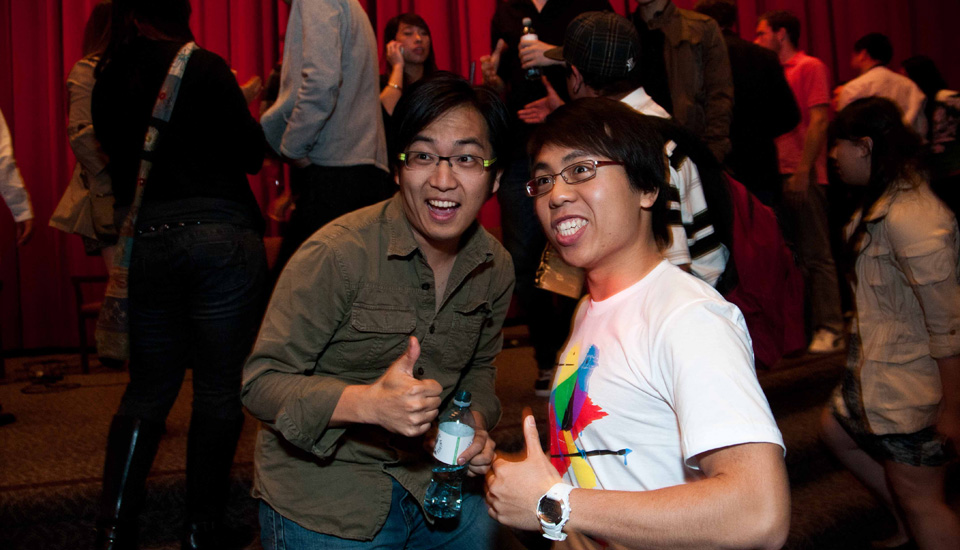
The 27th Los Angeles Asian Pacific Film Festival takes place April 28 to May 7, bookended by an overflow Opening Night premiere of Justin Lin’s FAST FIVE at the DGA, and the Closing Night premiere of Leehom Wang’s LOVE IN DISGUISE at CGV Cinemas. The 2011 Festival takes up residence for the first time at the CGV Cinemas in the heart of L.A. Koreatown, and organizes its slate of panels and seminars into the wildly popular Conference for Creative Content (C3), which brought over 200 attendees to a weekend of panels, discussions and special events centered around the growth of a digital space for Asian Pacific American cinema. Other highlights included a raucous 10th anniversary party for AngryAsianman.com; sold-out screenings for competition features WEDDING PALACE, BANG BANG, AMONG B-BOYS, and others; an overflow house for the Special Presentation, “Wong Fu Productions Presents: Fast Forward”; and a special retrospective tribute to Academy Award©-winning cinematographer James Wong Howe. A tenth anniversary presentation of Rod Pulido’s THE FLIPSIDE serves as a touching remembrance of WWII veteran-turned-community icon Peping Baclig, and works from Visual Communications’ very own Armed With a Camera Fellowship are presented for the first time at the DGA. And a robust Asian international showcase showcases the cinemas of Australia, Hong Kong, India, Indonesia, Japan, Malaysia, New Zealand, the Philippines, South Korea, Taiwan, and Thailand.
Photo: Actor and internet superstar Freddie Wong (with water bottle) shares face time with a fan following the panel, “Wong Fu Presents: Fast Forward” at the Directors Guild of America.
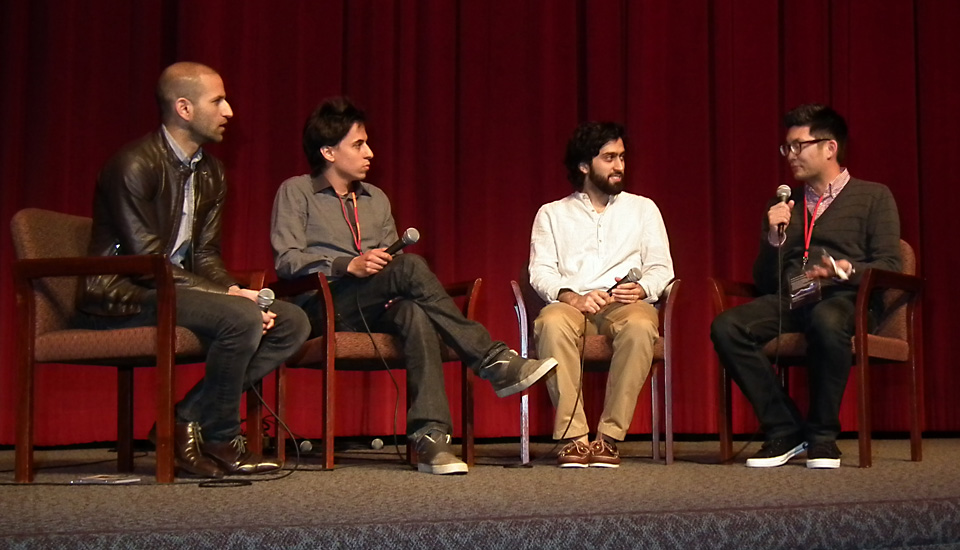
A bumper-crop of Asian Pacific American narrative features accompany works that evidence an ever-growing transnationalist direction as seen in gala offerings SHANGHAI CALLING and VALLEY OF SAINTS, by Angeleno Daniel Hsia and New Yorker Musa Syeed. The overwhelming number of Film Festival alumni returning with feature-length productions — Akira Boch, Yung Chang, S. Leo Chiang, Ernesto Foronda, Michael Kang, Ryan Kawamoto, Debbie Lum, Lily Mariye, H.P. Mendoza, and Richard Wong — is matched by a callow coterie of newbies weened on internet and new media-inspired cinema (to wit: Kane Diep’s UPLOADED, which sells out its World Premiere screening during Festival Week). Visual Communications introduces two exciting filmmaker support initiatives: the C3: Project Market and the Visual Communications Film Development Fund. Taiwan’s cinematic renaissance was observed through a specially-curated national spotlight, and genre cinema was well represented (BLOOD LETTER from Vietnam; HEADSHOT from Thailand; TORMENTED from Japan; WU XIA from Hong Kong). And in addition to its activities at the DGA and CGV Cinemas, the Film Festival expands its regional footprint by presenting programs at the historic Art Theatre of Long Beach, allowing for the inclusion of specialty programming for the Southeast Asian and Pacific Islander communities of the Long Beach and South Bay regions of L.A. County.
Photo: Moderator Phil Yu discussed director Musa Syeed’s lyrical VALLEY OF SAINTS at the Directors Guild of America with (from left) composer Mubashir Mohi-ud-Din, Producer Nicholas Bruckman, and director Syeed.
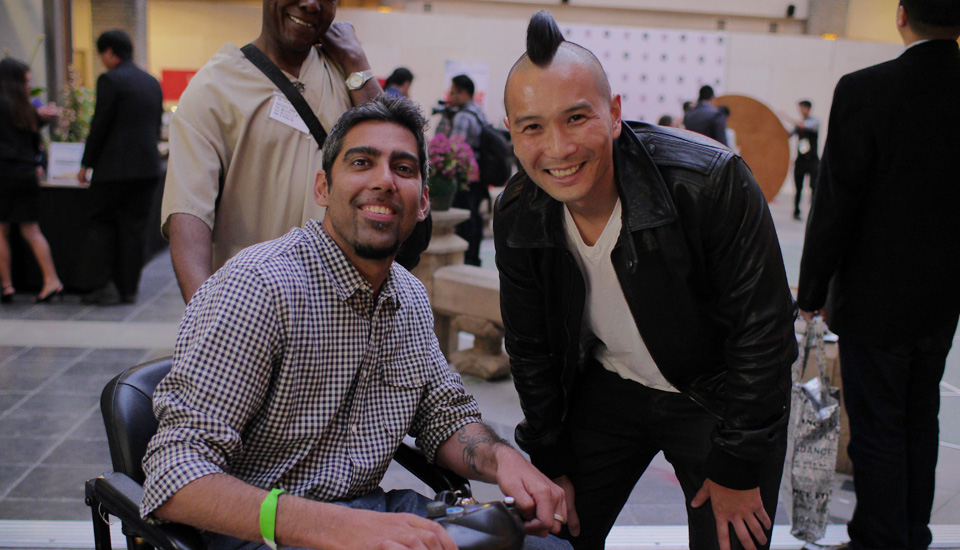
Festival Week 2013 was anchored by a trio of works directed by alums of Visual Communications’ Armed With a Camera Fellowship, sustaining high expectations for participants in VC’s long-running filmmaker initiative: LINSANITY by Evan Jackson Leong, SOMEONE I USED TO KNOW by Nadine Truong, and HAFU by Megumi Nishikura (co-directed with Lara Perez Takagi). The C3: Project Market was re-branded as Project Catalyst, but the mission remained the same: to enable filmmakers with the resources to realize full-length narrative feature films. Meanwhile, VC’s Film Development Fund conferred a $100,000 production grant to Tanuj Chopra; and on a bittersweet note, the 2013 Film Festival sees the conclusion of the highly influential Digital Histories initiative for senior media production. In brighter news, the Film Festival’s Encore Weekend activities at the historic Art Theatre of Long Beach is a rousing success, anchored by capacity crowds for Christen Marquez’ TO WEAVE A NAME and Keo Woolford’s THE HAUMANA; and a well-received encore screening of Benito Bautista’s HARANA.
Photo: Newly-minted award-winning directors Jason DaSilva (WHEN I WALK) and Evan Jackson Leong (LINSANITY) reunite during the Film Festival’s Closing Night at CGV Cinemas. The duo previously presented their works at the 2013 Sundance Film Festival.
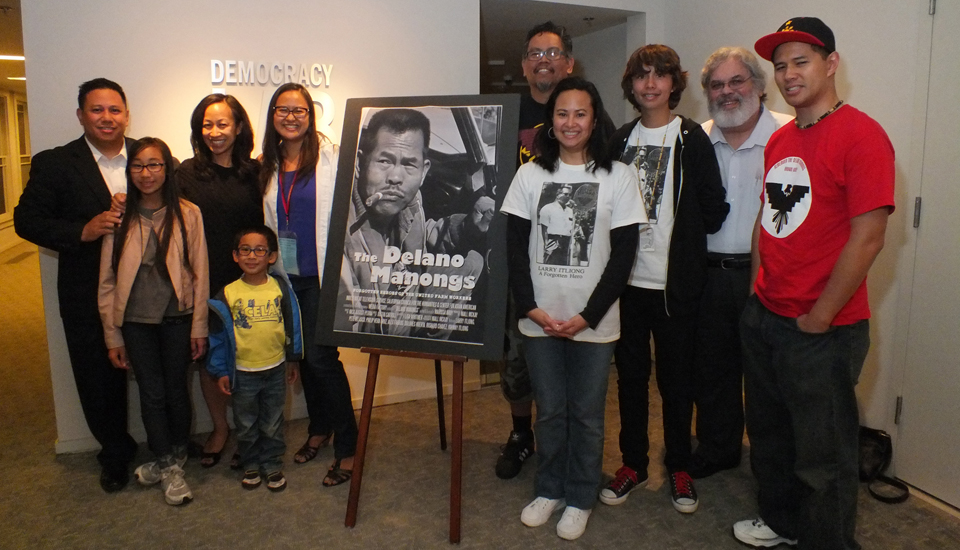
The thirtieth anniversary edition of the Film Festival saw the emergence of a new generation of filmmakers who brought mesmerizing feature-length efforts to the table, headed by Dean Yamada, the latest in a long line of alumni from the USC School of Cinematic Arts whose CICADA bagged the Grand Jury Award for Best Narrative Feature. Newcomers Esy Casey (JEEPNEY), Steven de Castro (FRED HO’S LAST YEAR), Ursula Liang (9-MAN), and Masahiro Sugano (CAMBODIAN SON) offered an exciting glimpse into the future of documentary films by Asian Pacific Americans while Festival veteran Rea Tajiri returned with the mesmerizing LORDVILLE. Aided by a grant from the Academy of Motion Picture Arts & Sciences, the Festival paid tribute to Hollywood screen legend Sessue Hayakawa and pioneering concept artist and designer Tyrus Wong; and elsewhere, the third edition of Project Catalyst recognized the team of brother Abel and Burlee Vang and their feature-length project THE TIGER’S CHILD. Hao Wu’s THE ROAD TO FAME captured the Grand Jury Award for Best Feature-Length Documentary; while Keola Racela’s elegant and daring ABOVE THE SEA was awarded the Film Festival’s Golden Reel Award for Best Short Film. Among other highlights: the large entourage of legendary “bad guy” talents that accompanied Stephen Dypiangco and Patrick Epino’s AWESOME ASIAN BAD GUYS; live performances that positively enhanced the local premiere screenings of Marissa Aroy’s DELANO MANONGS and Joel Quizon’s THE COTABATO SESSIONS; and strong Mother’s Day crowds for Grace Lee’s AMERICAN REVOLUTIONARY: THE EVOLUTION OF GRACE LEE BOGGS and Henry Chan’s Audience Award-winning 100 DAY.
Photo: Director Marissa Aroy (fourth from left) and supporters following the overflow L.A. Premiere screening of her documentary DELANO MANONGS: FORGOTTEN HEROES OF THE UNITED FARMWORKERS MOVEMENT.
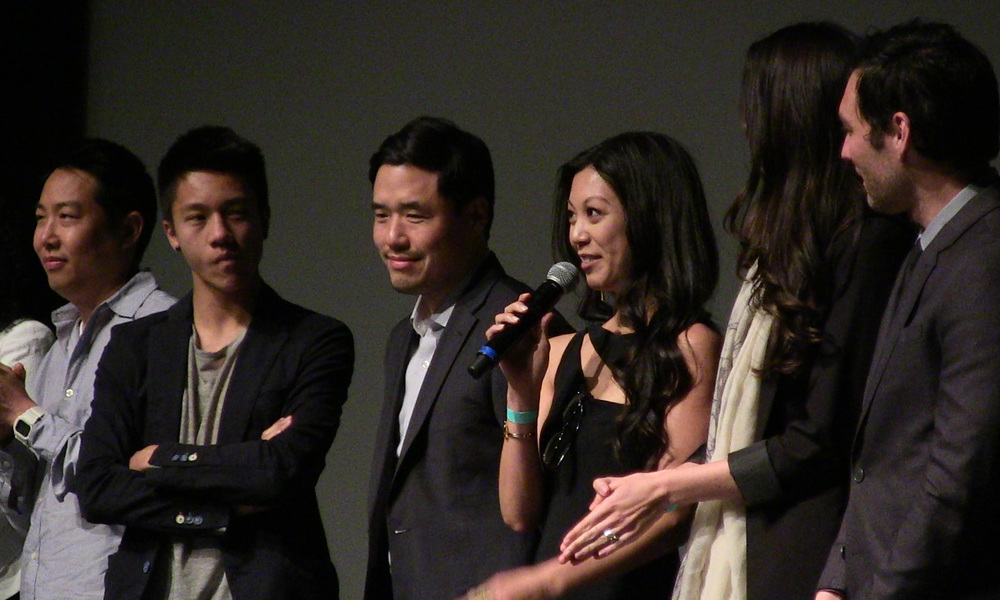
The 31st edition of the Film Festival saw a “company move” back to Los Angeles Little Tokyo, where the Festival began all the way back in 1983. With the Opening Weekend of the Film Festival now firmly esconsed at the Aratani Theatre, Tateuchi Democracy Forum at JANM, and Downtown Independent, Festival Week 2015 marked the introduction of new Visual Communications Executive Director Francis Cullado, previously the organization’s Operations Director and Festival Volunteer Coordinator. Bookended by the Opening Night World Premiere of Wong Fu Productions’ EVERYTHING BEFORE US and the Closing Night Los Angeles Premiere of Shonali Bose’s MARGARITA, WITH A STRAW, the Film Festival offered 145 feature-length and short works alongside the return of the Conference for Creative Content (C3) to the Festival framework. Also featured: a play reading of a cinema-inspired play, UNBROKEN BLOSSOMS by Philip Chung, and a “Mystery Science Theatre”-inspired retrospective screening of THE KARATE KID, PART II. A huge Festival Week audience equally combining longtime Festival attendees and millenials new to the Festival experience also enjoyed new works including Jennifer Phang’s ADVANTAGEOUS, Jim Choi’s CHANGING SEASON, Daniel Park’s KTOWN COWBOYS, Lawrence Gan’s LOVE ARCADIA, Ravi Kapoor’s MISS INDIA AMERICA, and Samantha Futerman and Ryan Miyamoto’s TWINSTERS. Directors Futerman and Miyamoto’s charming Korean adoptee story garnered the Grand Jury Award for Best Documentary feature, while Dax Phelan’s drama JASMINE (written, produced, and starring Festival veteran Jason Tobin) won the Grand Jury Award for Best Narrative Feature. Timothy Yueng of NYU’s Tisch School of the Arts bagged the Festival Golden Reel Award for his intense short 90 DAYS, while Festival veteran Ken Ochiai received the Linda Mabalot New Directors/New Visions Award for JULIET JULIET – THE SOUND OF LOVE MUSICAL.
Photo: Actress Brittany Ishibashi (with mic) accepts warm applause following the World Premiere screening of Wesley Chan and Philip Wang’s EVERYTHING BEFORE US at the Aratani Theatre in Los Angeles Little Tokyo.
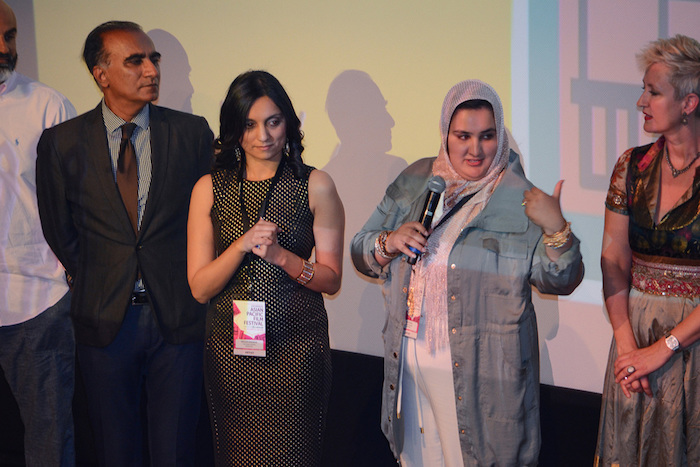
The 32nd edition of the Film Festival highlighted action, diversity, and inclusivity. The Festival kicked off with Lena Khan’s Grand Jury Award-winning THE TIGER HUNTER as the Opening Night film, Pamela Tom’s TYRUS as the Centerpiece presentation, and Jonathan Lim’s PALI ROAD as the Closing Night film. The Festival’s experience went outside the theater and into virtual realities through the FfF INTERACTIVE LITTLE TOKYO! exhibition by FORM follows FUNCTION, which included “Walking with Grace,” and “312 Azusa Street.” The 6th edition of the Conference for Creative Content (C3) continued to have engaging dialogues with creative artists about “diversity” and “action,” with panels on directing, producing, writing, and various technical aspects of the motion picture and television industry. Among other highlights: this year’s artist spotlight was filmmaker Dai Sil Kim-Gibson (SAI-I-GU, SILENCE BROKEN, PEOPLE ARE THE SKY); Amelie Wen’s “Fata Morgana” received the Linda Mabalot New Directors/New Visions Award; and two short films received the Golden Reel Award: “The Chicken of Wuzuh” by Sungbin Byun, and “The Lobster Kid” by Joseph Chen-Chieh Hsu.
Photo: Director and co-screenwriter Lena Khan shares a story from the set of THE TIGER HUNTER as actor Iqbal Theba, producer Megha Kadakia, and costume designer Justine Seymour listen in.
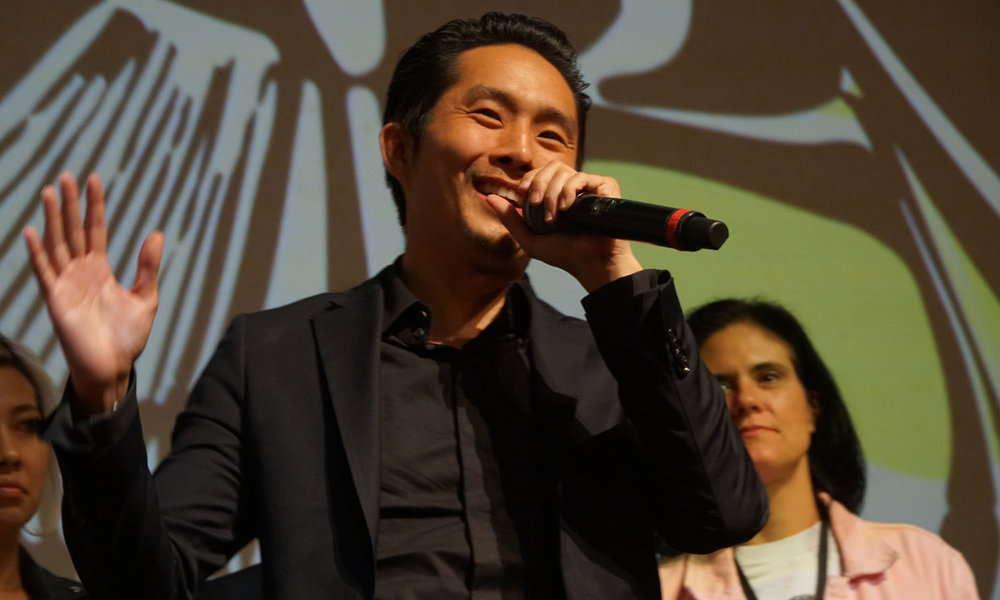
Politics and social impact was heavy on the minds of many of the filmmakers whose works arrived at Festival Week 2017. The opportunity to revisit, after fifteen years, director Justin Lin’s career-making BETTER LUCK TOMORROW on Opening Night set the stage for thoughtfully-curated commemorations of two red-letter events in Asian Pacific American history: the seventy-fifth anniversary of the enactment of Executive Order 9066 in 1942; and the twenty-fifth anniversary of the Rodney King Beating verdicts and resulting L.A. Rebellion in 1992. Narrative works as Mike Sakamoto’s NORMAN JONES, Nadine Truong’s I CAN, I WILL, I DID, and Kogonada’s Closing Night attraction COLUMBUS announced a break from the typical “Hollywood” moviemaking aesthetic; while insightful and topical documentaries as Jason Y. Lee’s SAVE MY SEOUL, Ashley Duong’s A TIME TO SWIM, and Robin Lung’s FINDING KUKAN brought much-welcome dimension to the audience experience. Along with the presentation of the expansive transmedia experience BRONZEVILLE LITTLE TOKYO, presentation of the winners of the inaugural HBO APA Visionaries short film competition, and the seventh edition of the Conference for Creative Content, the Festival hosted an SRO screening of Justin Chon’s timely dramedy of the L.A. Rebellion GOOK; and partnered with the Association for Southeast Asian Cinemas to present works as part of the ASEAC-SEACRN Symposium. GOOK walked away with the Festival Grand Jury Award for Best North American Narrative Feature, while SAVE MY SEOUL won the Grand Jury Award for Best North American Documentary. In a first for the Festival, the inaugural Grand Jury Award for Best Asian International Feature went to Yosuke Takeuchi’s THE SOWER. Festival veteran Yudho Aditya’s PRIA walked away with the Festival Golden Reel Award for best Short Narrative Film, making this charming production from Indonesia Academy Award®-eligible — a first under the Film Festival’s new arrangement with the Academy of Motion Picture Arts & Sciences.
Photo: Actor/Writer/Director Justin Chon at the Los Angeles premiere screening of GOOK on the 25th anniversary of the LA Uprising.
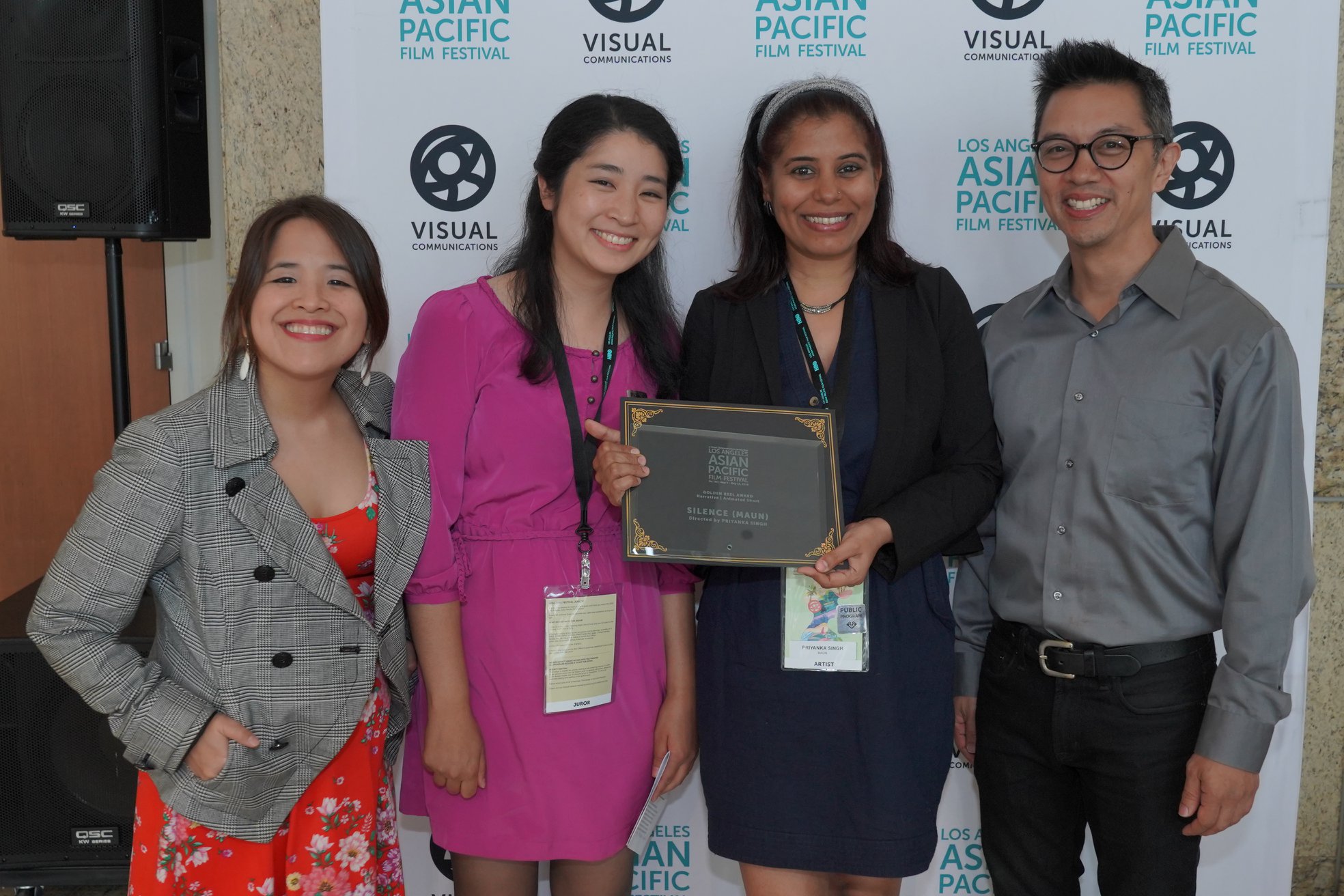
2018 has been a long and tedious year for many communities, ridden with what seems like never ending attacks on basic human rights. Now more than ever, the Film Festival has been a critical space for people of color, LGBTQ folks, and other marginalized communities to come together, resist, and find healing through visual media.
Director PJ Raval’s thoughtful execution of CALL HER GANDA not only points to the disproportionate amount of violence against the transgender community but also paints a larger historical backdrop of American imperialism. Caylee So and Visal Sok’s IN THE LIFE OF THE MUSIC, the Festival’s first Cambodian-produced Centerpiece film, captured the resilience of the Cambodian community despite the intergenerational trauma as a result of the Khmer Rouge.
Other highlights involve WARU, a collaboration of eight Māori female directors that took home the Grand Jury Award for Best International Narrative Feature, Golden Reel Award (Excellence in Narrative/Animated Short) Winner SILENCE (MAUN) by Priyanka Singh, which is now eligible to qualify in the Animated Short Film/Live-Action Short Film category of the Academy Awards®, the C3 Conference for Creative Content, and our Past//Forward Gala: Coming Home, part of Visual Communications’ series of signature events to celebrate the organization’s upcoming 50th anniversary.
Photo: Shorts Competition Festival Jurors Marie Jamora, Ada Tseng, and Kennedy Kabasares with Priyanka Singh, director of SILENCE (MAUN).
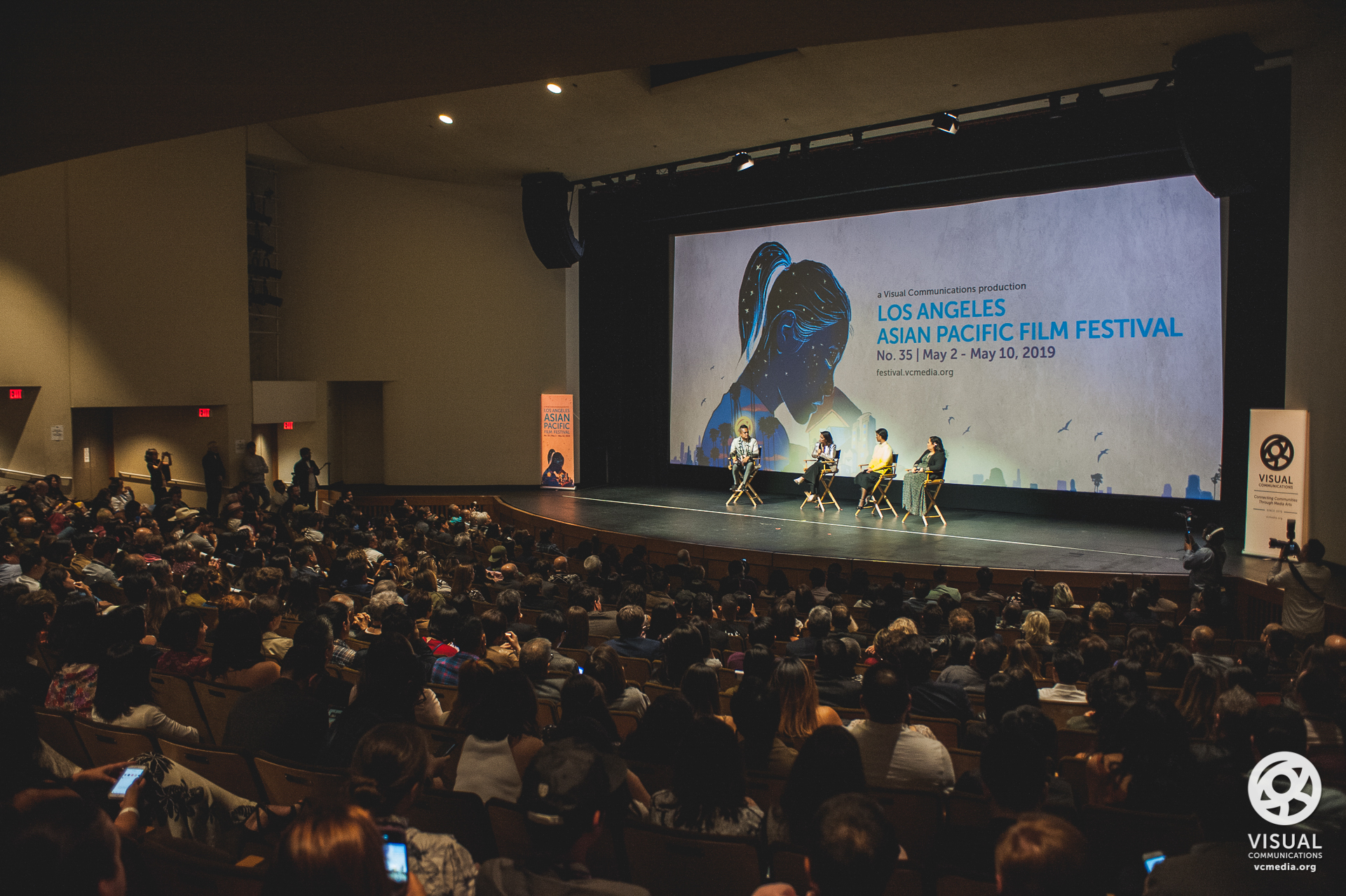
The 35th Los Angeles Asian Pacific Film Festival was another one for the books, starting with the world premiere of the award winning film YELLOW ROSE by Diane Paragas, the first Filipina American filmmaker to open the Festival. Our Centerpiece presentations featured the Los Angeles premieres of Emily Ting's GO BACK TO CHINA and Justin Chon's MS. PURPLE, and we wrapped with the world premiere of Andrea Walter's EMPTY BY DESIGN.
Other highlights throughout Festival week included the screenings of Lulu Wang's THE FAREWELL, Gurinder Chadha's BLINDED BY THE LIGHT, MOANA in ʻŌlelo Hawaiʻi, and award winning documentaries like Nico Evangelista, Jr.'s JOURNEY TO IFUGAO and FOR SAMA (dir. by Waad Al-Kateab and Edward Watts). Our short film programs were also an audience favorite, as we screened over 100 shorts that ranged over a wide scope of stories and expressions. Other special programs included Cinema Musica, which celebrated the intersection of cinema and music; C3: Conference for Creative Content, which featured multiple days of panels and screenings; REORIENT: Emerging Media, our new showcase for cutting-edge virtual reality, mixed reality, and interactive installations; and Centering the Masses, a series of free pop-up events in the Little Tokyo area.
Photo: Opening Night screening of YELLOW ROSE at the Aratani Theatre
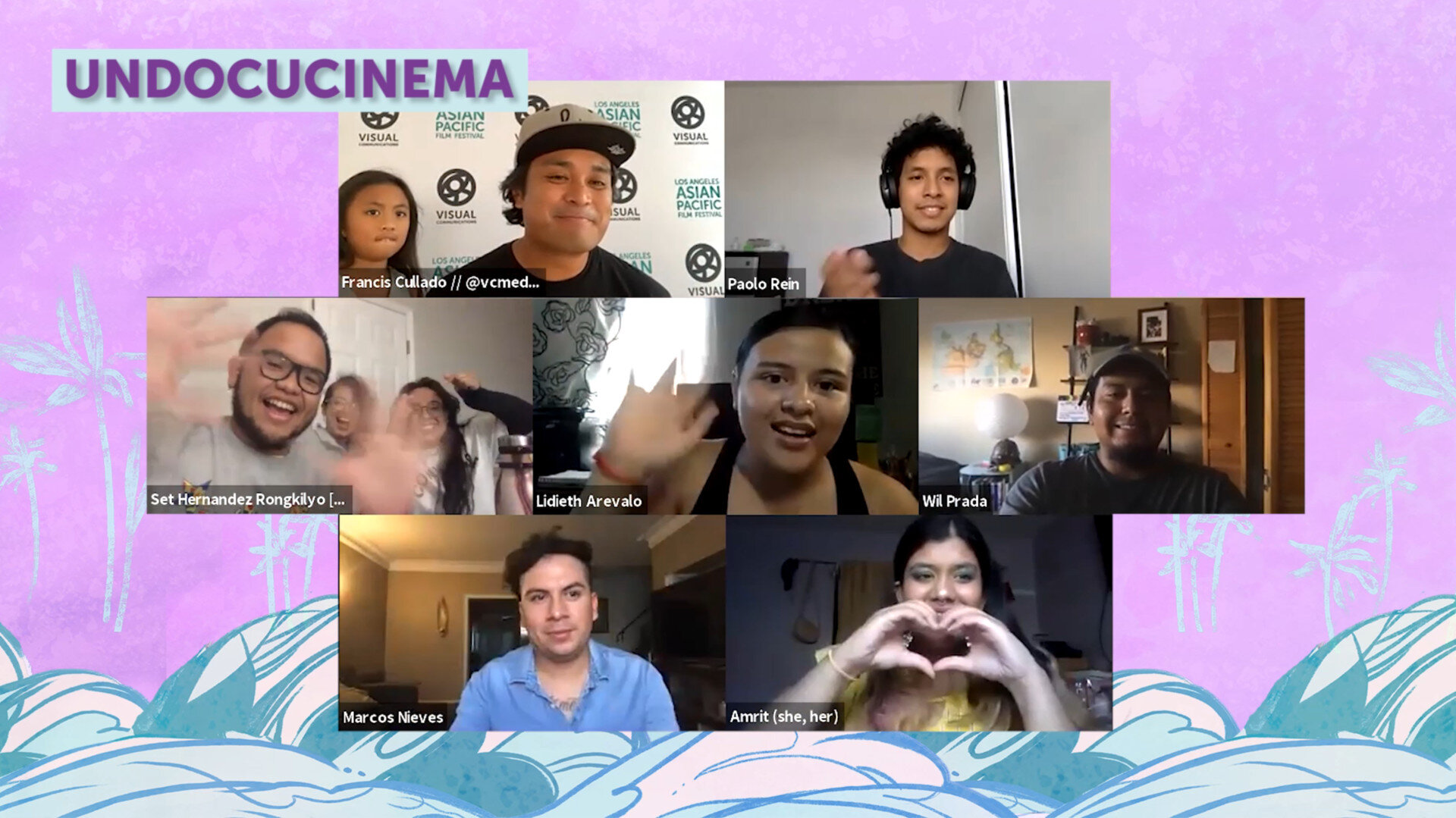
Due to the COVID-19 pandemic and the desire to keep our artists and audiences safe, our 36th annual Los Angeles Asian Pacific Film Festival was presented online from September 24 to October 31, 2020, reflecting a lineup that centered conversations that are most critical and compelling at this time. In our continued work to create spaces for expression, engagement, and empowerment, we proudly came together for a 38-day Festival to recognize the works of more than 250 artists, with over half of our programming free to the public. We presented over 135 programs, hosted over 75 panels and events, and reached over 40K people in over 109 countries globally to keep our community of artists connected. Click the image to watch a highlight video for the Festival.
Photo: Screenshot from our “C3: UndocuCinema” artist conversation, featuring filmmakers from the Undocumented Filmmakers Collective

After a year and a half of virtual presentations, Visual Communications brought back the 37th annual Los Angeles Asian Pacific Film Festival to in-person theatres and celebrated the works of seasoned and emerging artists from September 23 to October 2, 2021 at the Japanese American Cultural & Community Center’s Aratani Theatre, the Tateuchi Democracy Forum at the Japanese American National Museum, and Regal L.A. LIVE: A Barco Innovation Center. The 10-day Festival recognized the works of more than 140 artists, 19 countries, and 34 languages, opening with Ann Kaneko’s MANZANAR, DIVERTED: WHEN WATER BECOMES DUST, highlighting the always-present Indigenous interconnections that we often make invisible. We also presented Pacific Cinewaves, programming which represents LAAPFF’s commitment to amplify Native Hawaiian and Pacific Islander communities. Visual Communications is grateful for our storytellers and partners who believe in the power of media to build and connect communities.
Photo: Steven Lam
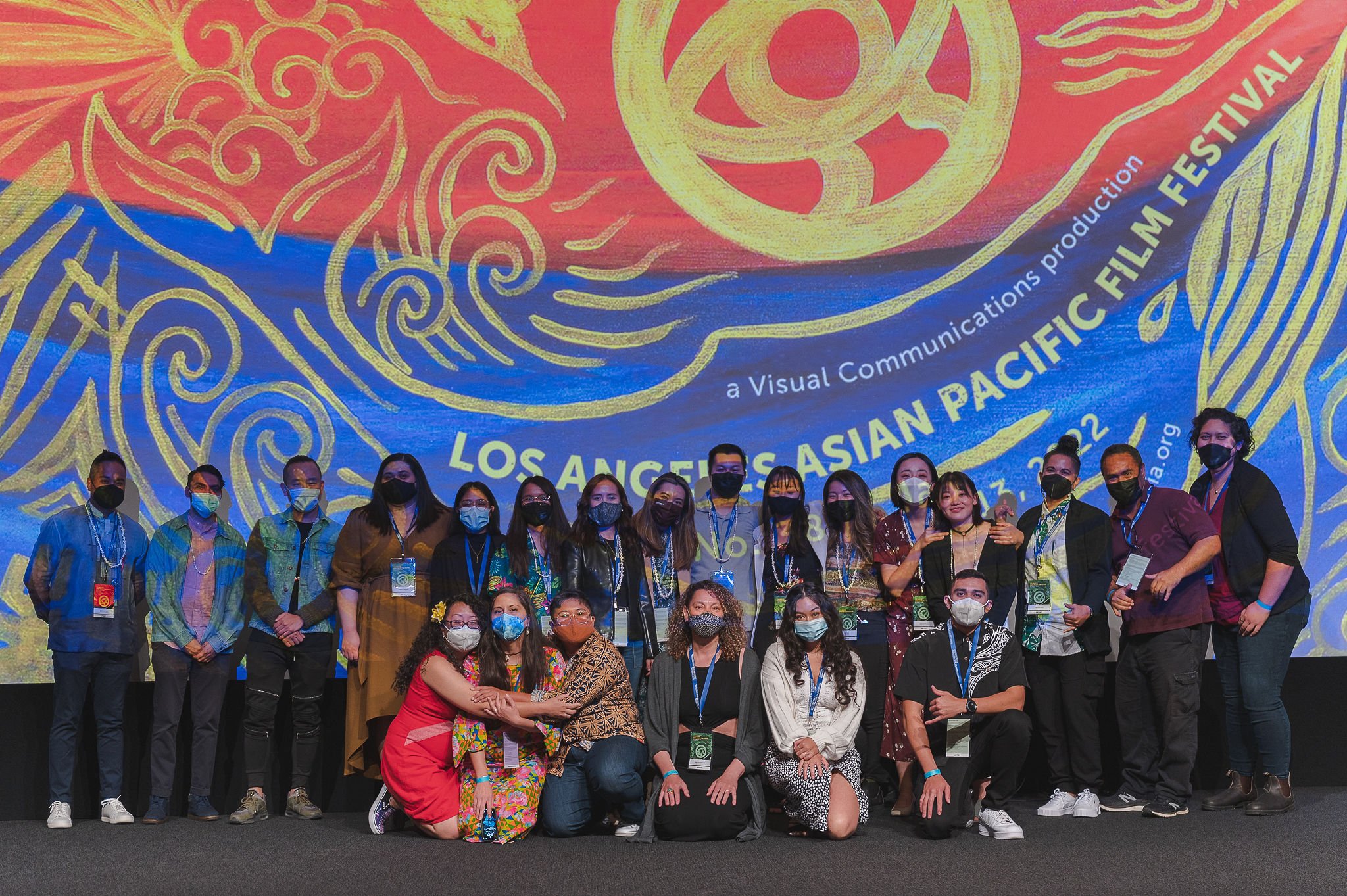
In our 38th edition, the Los Angeles Asian Pacific Film Festival continues to transform itself to reflect our ever-evolving artists and experiences.
The festival kicked-off May 5th at the Director’s Guild of America Theater with a robust Opening Day line-up that included: the World Premieres of 20th edition of Armed With A Camera films, the Los Angeles Premiere of Alika Tengan’s debut feature EVERY DAY IN KAIMUKĪ, Anam Abbas THIS STAINED DAWN, and special showcase featuring the Visual Communications archive, anchored by the early works of Robert A. Nakamura.
This year’s festival recognized the work of over 180 artists over 10 days. Additional highlights from this year’s program include: an artist conversation with Mira Nair, along with presentation of the Legacy Award to the acclaimed filmmaker, and the HBO Max APA Visionaries Short Film Competition.
Photo: Armed With a Camera 2022 & 2023
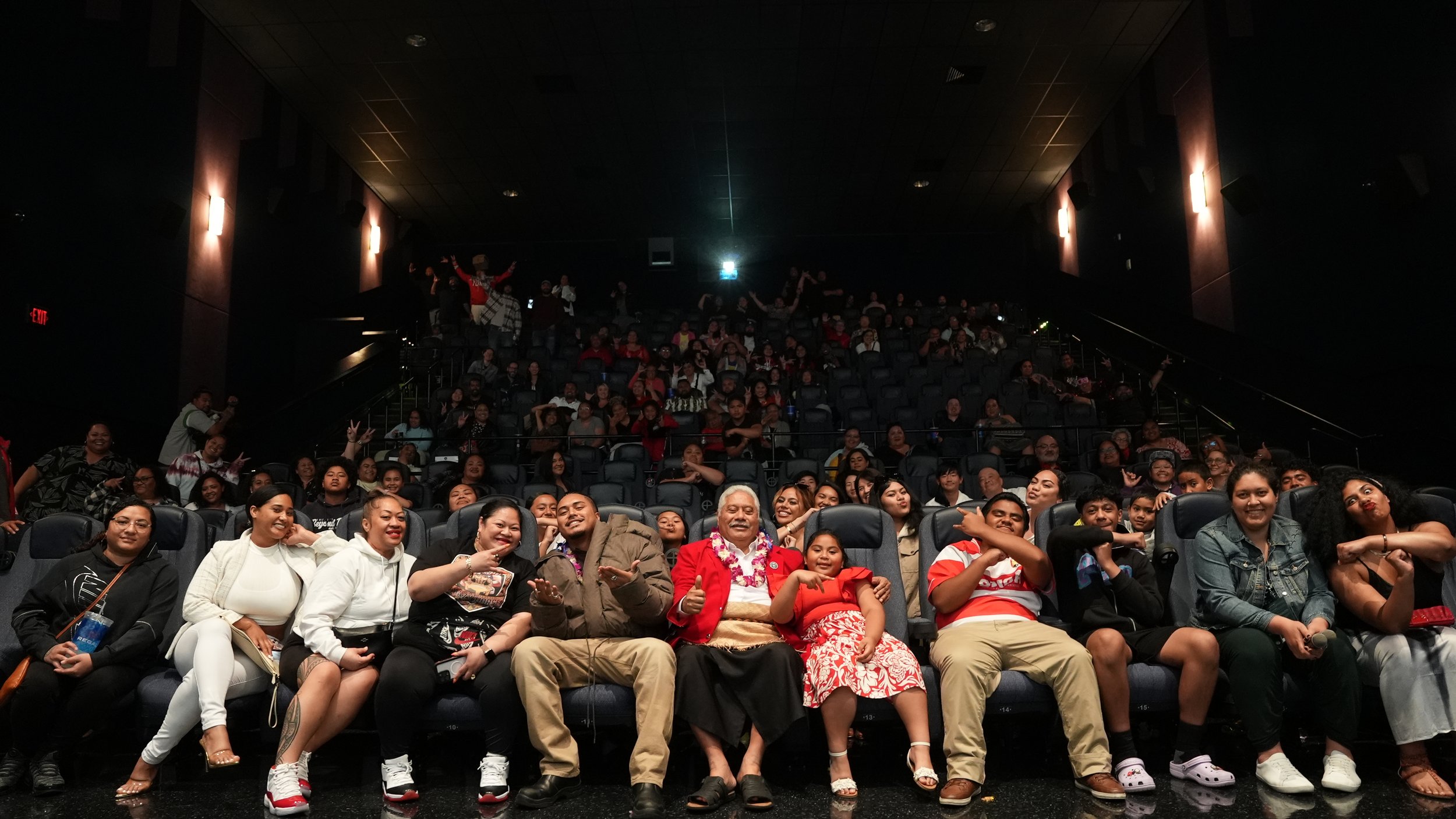
The 39th edition of the Los Angeles Asian Pacific Film Festival (LAAPFF) was dedicated to our former Executive Director, Linda Mabalot and her legacy. This festival season centered on Linda’s regenerative impact and cultural abundance to VC and our communities.
This year’s festival recognized the work of over 300 artists across May 4 - 13, 2023 – including our 2023 Armed With a Camera (AWC) Pasifika Cohort. In line with our renewed values of joy and wellness, VC launched R3:NEWAL, a series of restorative activities and gatherings to connect peoples as themselves, instead of our titles as artists and creators. Other highlights include sold out screenings of Pacific Cinewaves, #LIFE Shorts Program, Your Son Shorts Program, Battling Demons Shorts Program, The Harvest, KAPWA Texas, Red, White & Brass, and B-Side for Taylor.
Photo: RED, WHITE & BRASS Filmmakers and Audience at Regal LA Live
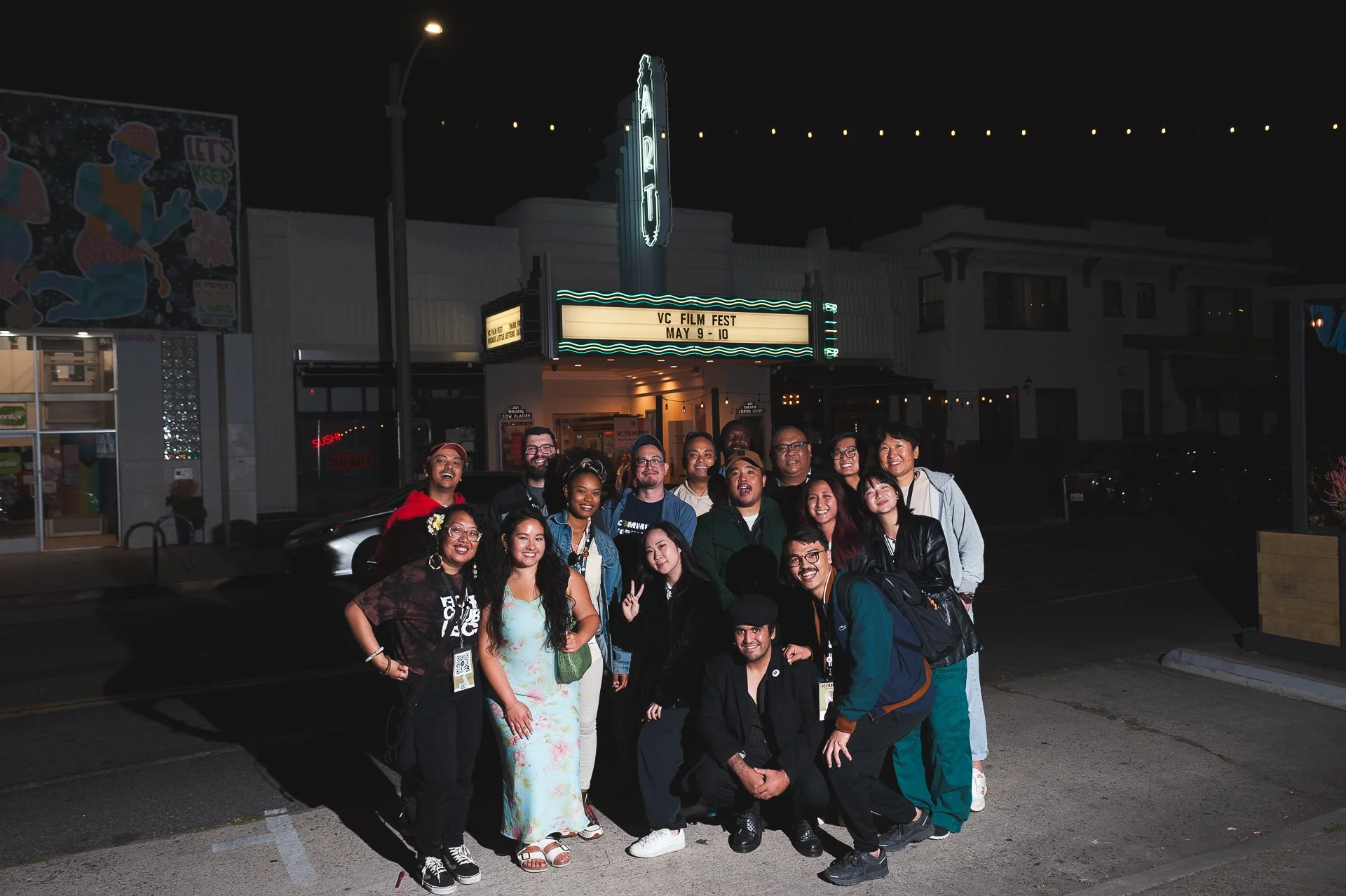
The 40th edition of the VC Film Fest / Los Angeles Asian Pacific Film Festival (LAAPFF) was dedicated to our founding Executive Director, Steve Tatsukawa (1949-1984). We remember his impact, his humor, and positive influence he had on those around him. Through stories and shared memories, we ensure that his legacy resonates with future generations.
This year’s festival celebrated the work of over 300 artists across May 1 - 10, 2024 – including our 2024 Armed With a Camera (AWC) and an unprecedented lineup of 15 world premieres from our Digital Histories program.
Photo: VC Film Festival Staff at Art Theatre of Long Beach
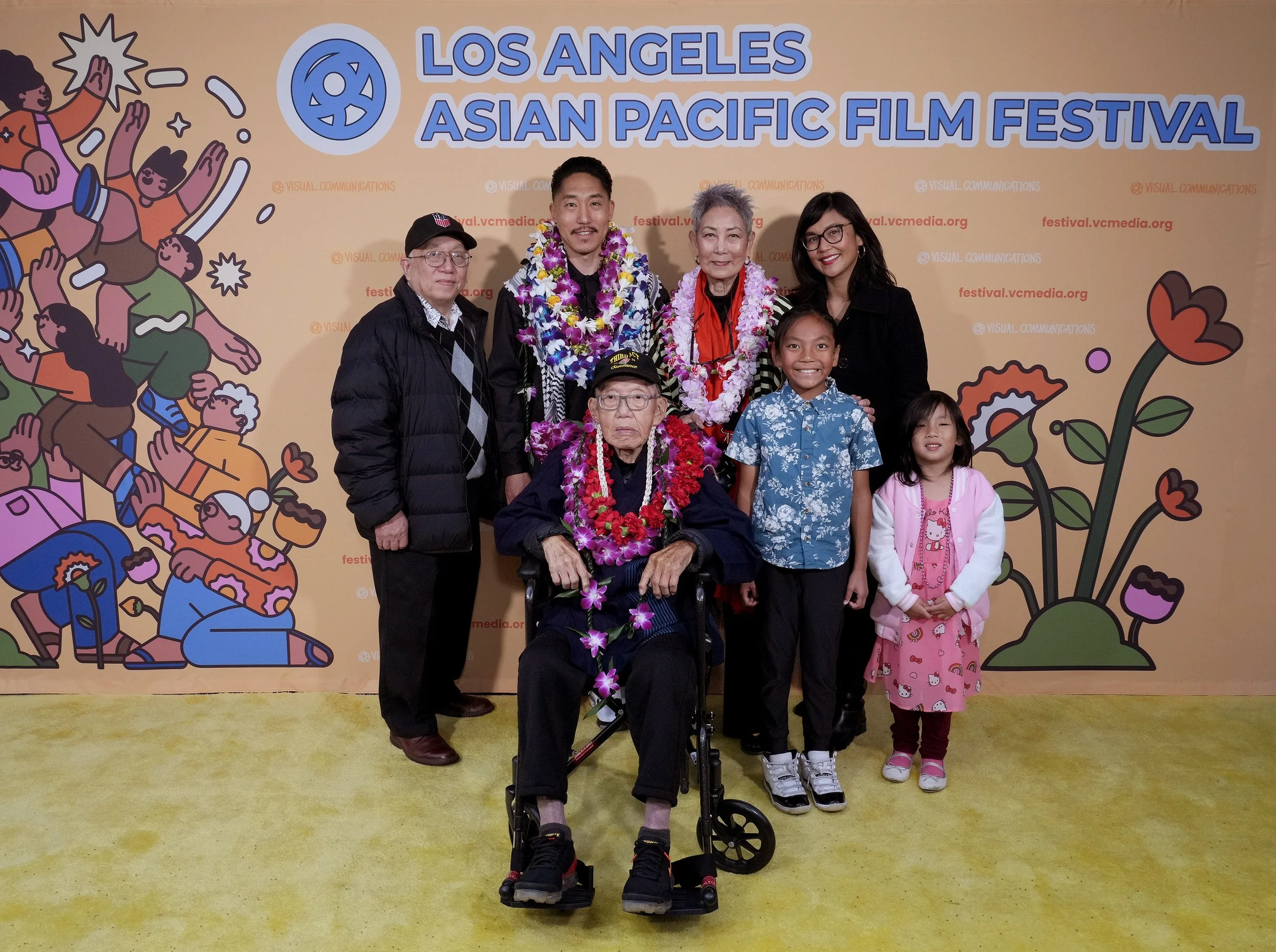
The 41st edition of the Los Angeles Asian Pacific Film Festival (LAAPFF) was dedicated to celebrating the boundless optimism and imagination of future generations, paying tribute to the profound potential young people hold in re-envisioning our collective future.
This Festival honors our cultural and movement workers who create worlds of truth and imagination. From presenting the stories of our ancestors and beloved elders, to stories unbounded by youthful energies, we bridge present and emerging generations of storytellers to living histories, so they understand that they are part of a movement. A movement rooted in rebellion towards liberation.
Photo: Nakamura Family at the Los Angeles Premiere of Third Act at the Aratani Theatre @ JACCC










































